
Before you go, check this out!
We have lots more on the site to show you. You've only seen one page. Check out this post which is one of the most popular of all time.

How Long Does It Take To Hear Back After A PhD Interview?: Key Interview Tips.
You had the doctoral interview and now you are in the waiting stage after you finished the interview. I am sure that you are asking yourself, “how long should you wait to hear from the selection committee on your PhD interview?”
It is reasonable to wait anywhere from a few weeks to a few months to hear back from the selection committee on your PhD interview. It varies a lot depending on how put together the university is on their selection process and how many applicants that the university is looking at. (Once you are done reading this post, you should look at the longer post of PhD interviews).
Why does it take so long to hear back from a PhD interview?
Guaranteed that you are freaking out right now. I do when I wait to hear back from any selection committee. What a stressful time for you! I know that you are wondering why it takes so long to hear back from the selection committee. The ultimate truth is that you are paying more attention to the time than the selection committee is. You have to see it from their perspective: They have probably done this job several times before, and it feels like a job to them. Not to diminish the importance of your waiting, but the selection committee just as a different perspective than you do.
Read this post to help you prepare for your PhD interviews. So helpful!
The other thing that you have to think about is that the selection process generally has to go through many ‘hoops’ and administrative discussions before they can communicate back to you. The university that you are waiting to hear back from has to double and triple check that they have the resources to fund your doctoral journey. They also want to make sure that you are the right person for the position. (You should read this post we wrote on what PhD students do all day – you might be surprised.)
Should you send a thank you email after PhD interview?
Absolutely. You should send a nice note to everyone that you talk to during the interview process. You should likely send this email about 1-5 days after your interview. It should say something like this, “Dear so and so, I just wanted to let you know how much I enjoyed the discussion with you. I looked further into what you were talking about, and your research interests. I very much enjoyed the research article on blaa. Most importantly, I want to say thank you for having the discussion with me and sharing your time. I know that you are very busy, and that spending even a bit of time with me, has inspired my doctoral journey. Best, Student.
Before you go through with your PhD, you should read this article on bad PhD experiences.
Do you need to know what PhD students actually do? You should read this!
No Response on the PhD Interview?
If you get no response after a period of time (say 2 months) after the PhD interview, I would move on. This generally means that you likely did not get the position, or you were put on a wait-list. It is likely that the person forgot to contact you.
If you want to make sure, you can prompt your contact during the PhD interview once again about how you enjoyed the PhD interview, and whether the position is still open. I would be quite subtle with this prompt, and wait a bit of time before you sent it.
If you need help on tips for applying to PhD programs and help through the whole process, you should check out this video:
PhD Rejection?
Remember, getting a PhD position is generally very difficult, so don’t feel bad about not getting the position. If I were you, I would ‘try, try again,’ until you find the position you were looking for! If you need motivation with your PhD, check out this post on the importance of doing difficult things in your life. The career is all about persistence, and the sooner you learn this idea, the more prepared you are going to be for research. You got this!
Read this why you need to be consistent and persistent in your PhD journey! Check out this post on why we really need to be cheering for each other a lot more.
Here are 20 super PhD tips that you should know.
The R3ciprocity Project started out as a side-project, where David Maslach created an App to help others get feedback on their work (r3ciprocity.com – it is seriously inexpensive and easy to use. You have to try it!) , but it is beginning to grow into a real movement.
Did you benefit from this post? Do you know of anyone at all that could use feedback on their writing or editing of their documents? I would be so grateful if you read this post on how to get feedback on your writing using R3ciprocity.com or let others know about the R3ciprocity Project. THANK YOU in advance! You are the bees knees.
Check out the YouTube channel , or some of these posts if you want to understand more:
If you like this post, you should check out:
Ace Your PhD Interviews Easily.
Five Frustrating PhD Questions To (Never) Ask A PhD.
How To Deal With Self-Doubts As A PhD?
David Maslach
Recent Posts
The PhD Journey: Embracing Challenge and Prioritizing Wellbeing
Embarking on a PhD journey is a remarkable endeavor that symbolizes not only academic dedication, but also a deep commitment to advancing knowledge in one’s field. However, this path is often...
Rethinking Success and Embracing the Journey: Lessons from the R3ciprocity Project
The Surprising Lesson of Going It Alone When I launched the R3ciprocity Project, I anticipated an outpouring of support from various groups like scientists, researchers, universities, and...
Interviewing and Talking with Prospective Faculty
The graduate application process varies broadly and depends on your specific academic program.
The variations might include:
- Admission decision based only on an online application
- In the cases where you are admitted to work with a specific faculty member, you should contact faculty directly
- A short list of applicants are invited for an on-campus interview trip
- Applicants are admitted first, and then invited for an on-campus recruiting trip
Because of the range of possible application processes, it’s critical to learn about each program's requirements. For some graduate programs, you will need to directly contact faculty because a specific professor will decide whether to admit you as their own graduate student. In these circumstances, make sure to contact the faculty directly. (When contacting faculty for the first time, see the side box below for suggestions.)
It will be important in your decision-making process to determine if you envision working closely with that faculty member and if you have complementary working and communication styles. The faculty member will also want to assess your experiences and how you work by communicating with you. Thus you will want to sharpen your interview skills as you communicate with faculty.
Some graduate programs will invite you to conduct a phone interview or invite you to the university for a campus visit (common in the biosciences). The interview is your opportunity to more thoroughly demonstrate that you have what it takes to be in the graduate program. You will want to show your understanding and enthusiasm for the research that you have done. Some suggestions to prepare for the interview are provided below.

My advice to the next generation of scholars is to never be afraid to ask for help. At times it may seem like brilliance is a singular, herculean effort, but a lot of great ideas have been shaped and molded from the minds of many. Whether it’s your advisors or peers, we’re all here to help. Never be afraid to acknowledge that you don’t fully understand something—collaboration is encouraged and celebrated.
— Bryen Irving, PhD candidate in Physics
1. Before the interview
- For campus visits, it’s OK to ask what is expected of you and how to prepare (e.g., if your travel expenses will be covered, how to dress, if you should bring your CV, etc.).
- Learn about the faculty and people you will be meeting or communicating with. Read about the research interests of the faculty, including abstracts or papers. Prepare at least 1-2 specific research questions for each interview.
- Review the research that you conducted. If it was published or presented at a conference, reread the paper, abstract, or poster. Prepare a brief (1-2 minutes) oral summary of your past work. What was the research question? How did you address it? What did you specifically complete and achieve? What are some possible questions that faculty might ask?
- Prepare detailed questions you have of the program you are considering. Generic questions (e.g., tell me about your program) indicate that you didn’t read the basics on their website, and so won’t leave a positive impression. Determine what’s important for you (specific research facilities, professional development activities, student groups, opportunities for collaborations, etc.) and research them online.
- Determine and list the questions you have about the program, university, and location of where you are visiting. What are you hoping to see and learn?
- Ask a peer or friend (e.g. a current grad student or postdoc who is familiar with grad school interviews) to help you sharpen your interview skills.
- Come prepared to the mock interview in professional attire and with your materials (CV, papers, etc.).
- If possible, video record your mock interview. Although many cringe at watching themselves, the video can be incredibly helpful in revealing blind spots.
- If your interview will be conducted via Skype or another video platform, some helpful tips are provided in this YouTube video .
- After the mock interview, ask your peer for honest and critical feedback. Listen actively without being defensive and allow your peer to speak openly, which will help you improve.
2. During the interview
- For campus visits, dress appropriately (usually business casual, but be comfortable); be on time; organize your papers (e.g., résumés/CVs, slides or images, questions).
- Even for phone/Skype interviews, dressing professionally will help you to mentally prepare for the interview.
- Speak enthusiastically about your work. Highlight your research accomplishments and/or professional growth. If asked to speak about a weakness, phrase your answer in a forward-looking manner to demonstrate learning and growth, and awareness of your weaknesses.
- You’ll want to sound positive and enthusiastic. But avoid excessive enthusiasm, which could be interpreted as naiveté or desperation. This is a tough balance to achieve, so practice with others.
- Listen actively to your faculty interviewers as they talk about their research.
- Ask questions, using your prepared lists. Take notes to remember comments and suggestions.
3. After the interview
- Summarize your perceptions of the program, university, and environment. Make a table listing the pros and cons. List the people whom you met on your visit, and write a brief comment for each person to help you remember your interactions. Is it a good fit for you?
- Email your interviewers and thank them for their time. Follow up if you promised to provide any materials. Even if you determine that you don’t wish to work with that faculty member, this isn’t the time to burn bridges, and you might bump into them in the future.
- Reflect on your interview performance and make adjustments to strengthen your next interview.
contacting faculty for the first time
Your first contact with faculty is absolutely critical, because you don’t get second chances to make a first impression. You’ll need to craft an initial email message that will clearly communicate who you are, and why you’re reaching out to them specifically.
This can be very challenging because you’ll need to be clear and concise in a brief email message. Provided below is a sample email message with additional suggestions.
Don’t simply copy this message, but this example provides a template that can be used to customize your own initial email message.
Subject: Ecology PhD Program at Stanford
Dear Professor Peter Beak, I am currently a senior and McNair Scholar at UC Davis, and would greatly appreciate an opportunity to briefly speak with you about your research and the Ecology and Evolution PhD program at Stanford. I am seeking to pursue a PhD in Ecology, and my research advisor (Professor Emilio Laca) spoke highly about Stanford’s graduate program. I am particularly fascinated by studies on the influence of infectious diseases on population dynamics and community interactions. I have conducted similar research here at UC Davis, and also at Northwestern University using freshwater plankton, and won an oral presentation award at ABRMCS. These are further described in my attached CV. I carefully reviewed your website, and would greatly appreciate speaking with you on the phone (~15 min) to learn more about future directions of your research, particularly on developing mathematical models. I am available during these time slots. Please let me know if any of these work for you, and I’d be happy to offer more time slots if needed.
Sept 1, Wed 12-5 pm Sept 3, Fri 12-7 pm Sept 6, Mon 12-7 pm Sept 7, Tue 9-12 pm
Steve Lee McNair Scholar splee "at" ucdavis.edu (cell) 650-555-1234
- Use a brief subject line. Avoid vague subjects (e.g., “question” or “request”).
- Address them by their full name and professional title. Don’t use “Hi” or “Hey” or other informal greetings.
- In the very first sentence, quickly summarize who you are and why you’re contacting them. If a person known to the professor suggested that you reach out to them, include that info also.
- Explain why you’re contacting them specifically. Describe your highlights briefly. Attach CV and/or link to LinkedIn profile. Include other links as needed.
- State your request; be specific. Make it easy for them to say yes to your request; provide ample times when you’re available.
- Include your full name. If you’re in a graduate prep program, include info. Include your email and phone.
© Stanford University, Stanford, California 94305
- Graduate School
“Tell Me About Yourself” PhD Interview Question & Expert Answers
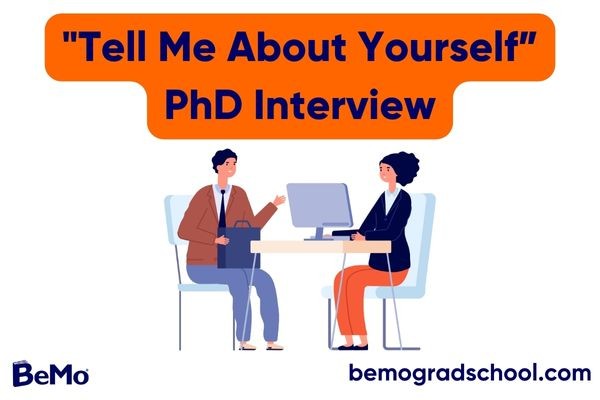
The “tell me about yourself” PhD interview question seems like something you do not need to prepare for or think about. But ignoring the importance of this interview question imperils your candidacy, since admissions committees scrutinize this part of the interview as much as other elements of your application, like your grad school statement of purpose , research resume , or statement of intent . The “tell me about yourself” PhD interview question is among the most common and difficult graduate school interview questions, but the right prep will help you start the interview and set the tone for the rest of your conversation.
This article will detail the purpose behind this tough interview question, show you ways to build a response, and provide you with expert sample answers to inspire you.
>> Want us to help you get accepted? Schedule a free strategy call here . <<
Listen to the blog!
Article Contents 9 min read
What is the purpose of the “tell me about yourself” phd interview question.
“Tell me about yourself” is not a trick question. We promise. Graduate school interviews are designed to learn more about you, beyond the grades, test scores, and academic achievements listed on your graduate school resume . The point of the “tell me about yourself” PhD interview question is to get at the heart of what defines you as a person, student, instructor, and scholar. In short, this question is truly your chance to stand out.
But the “tell me about yourself” PhD interview question is also an exercise in conciseness and self-awareness. The way you answer matters as much as the content, and it reflects a lot about how you express yourself, how you see yourself, and what about your personality, intellect, and past experiences motivates you to pursue such an advanced degree.
Want to ace your grad school interview? Check out this video:
How to Prepare and Structure Your Answer
Areas to cover.
1. Background
PhD admissions officers are interested in your background, so you should start your answer with personal details like your name, where you were born, etc., and then mention more specific details, like your school, the degree you just finished, and what you’re doing currently, academically or professionally. You can also talk about other things unique to you, like if you’ve changed cities or countries to pursue your degree, and whether you are a parent.
2. Personal Story
You can use the introduction as a springboard to talk about the “inciting incident” of your story; the moment or event that made you realize you wanted to pursue art, engineering, or medicine. It is unique to you, obviously, but you should also be mindful of not spending too much time on describing the incident but rather, using it as a way to transition to the next section.
You can talk about the lead-up to the story, and the aftermath. Did your perspective change? Were you motivated to find answers to a problem or remedy some injustice? Talk about your motivations, feelings, and emotions in detail to make your story authentic and personable, while not devolving your story into parody or self-seriousness.
I think my passion for the fine arts started in my childhood church. Every Sunday I would stare at the murals depicting scenes from the Bible, mostly because of how different they were from traditional interpretations of religious imagery. The artist who designed these murals chose a more modern style to depict them. He used faceless figures and elongated shapes for their bodies instead of typical line drawings or classical imagery.
I was puzzled. But, at the same time, I thought it was bold. I realized how art can be freeing, in both style and subject. I saw how an artist expresses themselves through their choices and how those choices reflect their ideas, worldview, and state of mind. It was these possibilities that got me sketching. But that phase lasted only a few years, mostly because I had no talent for drawing.
However, my interest in the fine arts never went away. I knew that even if I could never be an artist, I could still have a career in research, restoration, and exploration of art history. I entered an undergrad in Art History with an emphasis on ancient art, which I buttressed with a part-time job working in the Winters Sculpture Gallery at Downtown University. It was working in the gallery that let me see how people truly interact with art. I was touched by the time and contemplation people put into an image or sculpture, regardless of the style or subject, the way people in churches sit, in silence, surrounded by what they consider holy and beautiful.
Exploring themes of worship and idolatry during my undergrad made me recall my own early childhood experiences. It was then that I decided that I wanted to go further in examining the never-ending relationship between art and religion. I had my mind set on going to Europe – Florence or Turin specifically – and going into depth on the exchange between art and religion throughout the Renaissance up to the present. I even started learning Italian.
However, it was around this time when news broke of the discovery of thousands of remains at residential schools, which, made me question what I was doing in a significant way. The Catholic Church was largely responsible, along with many others, for these horrors. After learning about this terrible news, I could not reconcile the fact that I was about to devote my life to the study of religious art based in Catholicism, while the same Catholic church actively participated in cultural genocide. It was a wake-up call. I realized that too much time and effort has been put into classical and Renaissance art, and I didn’t want to be part of that tradition.
I began researching how Indigenous cultures in Canada represent, interpret, and express their spirituality in ways that are far removed from Judeo-Christian spiritual practices. While doing this research, I felt in myself a desire to right the wrongs of the past. Rather than reinforcing the supremacy of one tradition, I wanted to learn about another so that I could help in preserving and disseminating it. Many had fought for centuries to preserve and pass down the rich, cultural legacy of Indigenous spirituality, despite the unyielding forces opposed to it and I wanted to participate in understanding it as much as I could.
When I entered the Master of Fine Arts program at Waterloo University, I sought out Dr. Patrick Bouvier, who identifies as Metis and researches storytelling practices unique to Indigenous cultures. Dr. Bouvier was kind enough to help me define my research interests, given my art history background, and it was through him that I found out that the boundaries between Christian and native spirituality are fluid and that many Metis incorporate Christian practices into their ceremonies.
I also became aware that Indigenous spirituality, by its nature, escapes definition and contextualization. It is less about holy texts, churches, and congregations and more a way of life, a way of understanding your relationships with nature, people, and the past. Even the term, “Indigenous spirituality” is problematic, given the poor job it does of relaying the complex beliefs of First Nations peoples.
Through Dr. Bouvier’s mentorship and guidance, I became acquainted with this school’s Indigenous Studies program. One of the aspects of this graduate program that stood out for me was that it was the first of its kind in North America, created with the input and guidance of First Nations representatives. The immersive aspect also intrigued me, as the program embraces the central role played by the environment and hands-on learning in Indigenous culture. I am eager to experience these traditional knowledge concepts and bond with the Elders who make themselves available to students in the tradition of Indigenous pedagogy. The fact that there are almost no programs or fields that marry traditional art history studies with Indigenous culture means that there is a dire need for further exploration, which is what I hope to achieve when I complete my PhD.
“Tell Me About Yourself” PhD Interview Sample Answer #2
I recently graduated from the Autonomous University of Sinaloa with a master’s degree in Astronomy and Astrophysics, where I presented a thesis on the life of stars (their birth, existence, and death) that questioned formation theories and examined the role of the cold dark matter model in classifying new stars.
The stars and universe have always fascinated me, ever since I was a boy growing up in Mexico City. In the capital, you don’t see a lot of stars. It’s for the same reasons that people living in large cities cannot see more than a few stars at a time: light and air pollution. I could never imagine that one day I would see a night sky blanketed with stars – as many stars in the sky as there are grains of sand on a beach. But it happened one night.
I remember when I was ten – I remember very clearly how old I was because this experience shaped me forever – I left the city to go visit my relatives in Oaxaca, which is very far from the Distrito Federal. It was the first time I left the city, and it was a long journey. But during the last few hours of the trip, we drove through the Sierra Madre del Sur mountain range.
I was mesmerized. At such a high elevation, so far from the city, the sky lit up with stars. That beautiful sight sparked more than just awe; it made me ponder my relation to time as well. That’s why I remember how old I was because, in that moment, I said to myself, “I am ten years old now, but will I remember this when I am twenty, thirty.
The “tell me about yourself” PhD interview question is nothing to fear, provided you prepare. Once you have your answer, your preparation should also involve mock interviews so that you can become comfortable with the format, time your answer, and make adjustments. You can reach out to PhD admission consultant s to help you practice because they have the most experience with the “tell me about yourself” PhD interview.
If you feel that you need some graduate school application help to guide you in the interview, or any part of the application process, don’t hesitate. But following the steps in this article can also help you in crafting an authentic response. When you do have an answer prepared, try rehearsing a few key points so that you know how to move your story along. You should practice reading it out loud to be comfortable with the material, but don’t go through the effort of memorizing lines, as this will make you seem inauthentic.
Interviewers ask this question as an icebreaker to ease the pressure and put interviewees at ease. But it also serves the real purpose of getting a candidate to talk about themselves and how their experiences (both academic and non-academic) have shaped their academic interests.
You can answer the “tell me about yourself” question by telling a personal story of how you ended up at this interview. You can also start by talking about your present if you’re a recent grad or about what you want to achieve. The key is to create an easy-to-follow narrative that showcases what prepared you for the program you’re applying to.
You can practice beforehand and time yourself, keeping your answer to around the two-minute mark to avoid incoherence and rambling.
Do not talk about personal stories unrelated to your academic pursuits. You can certainly incorporate hobbies, passion projects, or general interests outside of academia, but try to weave all these elements of your personality into a convincing portrait of you as a PhD candidate. Also, avoid mentioning anything you are uncomfortable talking about later in the interview. For example, if you are uncomfortable discussing your family background, do not bring it up in the ‘tell me about yourself’ answer because the admissions committee might ask follow-up questions about it.
PhD and postdoc interview questions can broach a number of topics, from asking about your professional ambitions to how you would apply for funding. Be prepared for personal and field-related questions; they will make up the bulk of your interview.
You can practice your answer in front of a trusted colleague, mentor, or grad school advisor to get worthwhile feedback. We strongly encourage the use of mock interviews to get the best results. Your advisor, whoever they are, can provide tips and constructive criticism on how to improve your answer or where it excels.
The answer is supposed to come from you and your personal experiences, so you should brainstorm and prepare your answer personally. While advisors and consultants can help you shape it and improve the delivery, only you can tell your own story.
Every graduate school and every program have their own program-specific requirements, but the average requirements include a specific GPA,, a specific GRE score, and supporting documentation like a statement of purpose and letters of recommendation .
Want more free tips? Subscribe to our channels for more free and useful content!
Apple Podcasts
Like our blog? Write for us ! >>
Have a question ask our admissions experts below and we'll answer your questions, get started now.
Talk to one of our admissions experts
Our site uses cookies. By using our website, you agree with our cookie policy .
FREE Training Webinar:
How to make your grad school application stand out, (and avoid the top 5 mistakes that get most rejected).
Time Sensitive. Limited Spots Available:
We guarantee you'll get into grad school or you don't pay.
Swipe up to see a great offer!

Community Blog
Keep up-to-date on postgraduate related issues with our quick reads written by students, postdocs, professors and industry leaders.
Questions to Ask During Your PhD Interview

- By Zebastian D.
- August 22, 2020

As someone applying for PhD positions, you’ll no doubt be thinking of and preparing for the interview with your potential supervisor(s). You’re absolutely right to be doing this and planning your answers to some of the PhD interview questions that they’ll probably ask you; make sure you’ve read our guide on this to help you prepare.
Remember though that the PhD student-supervisor relationship works both ways; as much as the potential supervisor is interviewing you for a PhD position within their lab, you should also have the mindset that you’re also interviewing the professor for the role of supervisor, and be ready to ask questions! Ultimately the key thing you want to know after your PhD interview is you are both a good fit for each other.
With that in mind, I’ve prepared a common list of questions that you should consider asking to help you decide if the supervisor and the research lab is the right fit for you. You don’t need to ask all these questions but instead use this list as a guide for picking what feels most important to you.
I should also note that some of the answers to these questions can usually be found through a quick Google search of the potential supervisor or looking at their university profile. So do think about which questions in particular you want to bring up in person at the PhD interview.
Now on to the questions….
How many PhD students have you supervised previously, and did they all gain their PhDs?
You’re asking this to firstly work out how experienced the professor is at supervising students, based purely on the numbers previously supervised. The reason to ask the second question of how many students gained PhDs is to get an idea of the supervisor’s track record of successful supervision. The lower the percentage of students that went onto complete their PhD under his or her supervision (and not leave the program early ), the more alarm bells that should be ringing for you. This of course shouldn’t be your only data point in the decision-making process, and you should try and find out more about why those that left their PhD program before completion, did so. Equally it’s also a possibility that some students have been successful in their PhD research in spite of a supervisor’s lack of support. A good way to get a truer sense of this is by speaking to the supervisor’s current and past students.
Whilst a supervisor’s successful track record can be reassuring, don’t be put off if they haven’t supervised many (or even any) students before, particularly if they’re still fairly new in the job. There are many other ways in which you can get a sense of the supervisor-student fit.

How many years does a PhD project usually take in your lab?
If you’re in the UK, a full time PhD should normally take you 3-4 years to complete , as reflected by most funding grants for PhD research being for this time frame. You want to know and have some reassurance that most students in this lab do finish within this time frame. Asking this question will also help you better understand the supervisor’s attitude towards completion time frames; is this someone that would have no issue with a student that’s been working on their PhD for 6 years or are they driven to help students complete ‘on time’.
What are the key milestones for progression that you expect from students?
This is a good follow on from the previous question. Some supervisors can be very ‘hands off’ and set no expectations on their students about deliverables and if this is the type of student-supervisor relationship you’re after (which some are), then perfect!
However, whilst a PhD project is an independent body of work, that doesn’t mean you have to do it in isolation. Having a supervisor that also acts as a mentor is important; a key aspect of this is to help keep you on track to complete your project ‘in time’, which is most effectively done using regular milestones.
The actual milestones will vary between supervisors but what you’re looking for in their response is some indication that they’ve actually thought about them. Examples of milestones may be the completion of the literature review within the first 6 weeks of starting, first experimental data captured by month 3 and first paper published by the time you end year 1.
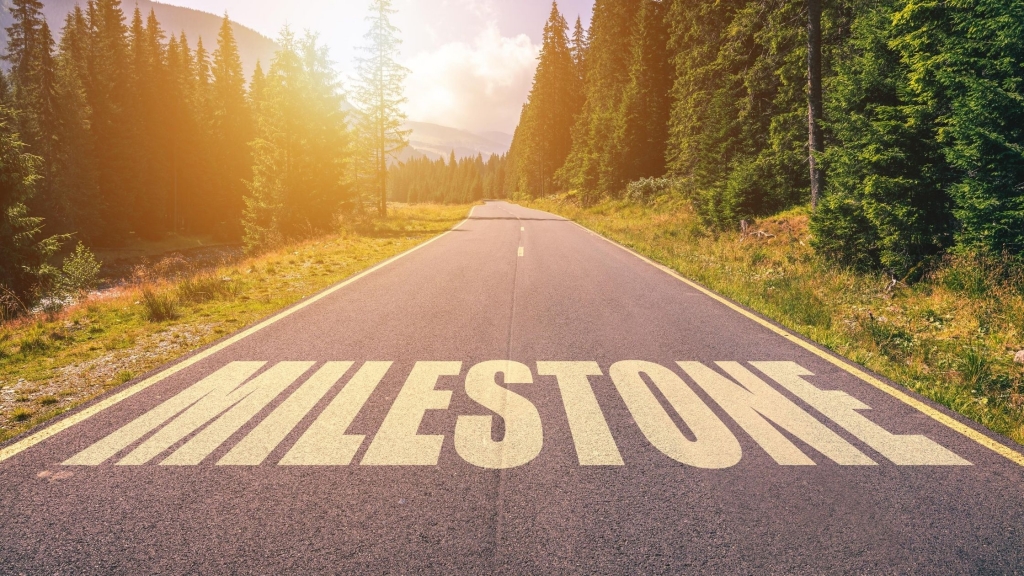
How many other students do you supervise?
You ideally don’t want your supervisor to have too many (>5) other PhD students under his or her supervision at any one time, simply because of the dilution of their time that will naturally occur. Being part of an active research lab is a big advantage however, so you don’t necessarily want to be the only student under their supervision either. Remember that the professor may also be responsible for several Master’s and undergraduate students too so you just need to know what to realistically expect from him in terms of available time to meet with you regularly.
How often do you meet with your PhD students?
You don’t want a supervisor that’s too prescriptive in how you run your project, but you do want someone who you know you can rely on to meet with regularly. Some professors set weekly one-on-one or group research meetings that occur at the same time, day and venue; you know exactly what you’re getting here. Others tend to meet less frequently but still at regular intervals. A good balance would be to have catch up meetings every 2 weeks but it’s important to know upfront what the expectations are from both sides about how often to meet.
Finding a PhD has never been this easy – search for a PhD by keyword, location or academic area of interest.
How flexible is the direction of the PhD project?
At the PhD level of higher education, the supervisor is there to provide mentorship and guidance to help you avoid going in a completely wrong direction with your research. You should however expect to have the freedom to take your project in any direction you want to (within reason). This should be the case even if it means deviating from the original research questions that were proposed at the start; you and your supervisor should be in agreement before you start about how much flexibility there can be. Remember too that sometimes the project may have to stay closely aligned to the original plan if it’s required by the industry funder, so this decision may be out of the supervisor’s hands to some extent.
What funding is available for this project?
You should know by the time you come to interview if the project is to be self-funded or if there is specific funding associated with it. It may feel like an awkward question to ask but you need to be very clear on how much of a living stipend you should expect and if there is any additional funding for things such as conference travel, paying for journal publication fees or other bench fees; you don’t want any unpleasant surprises about finances when you’ve already started the PhD.
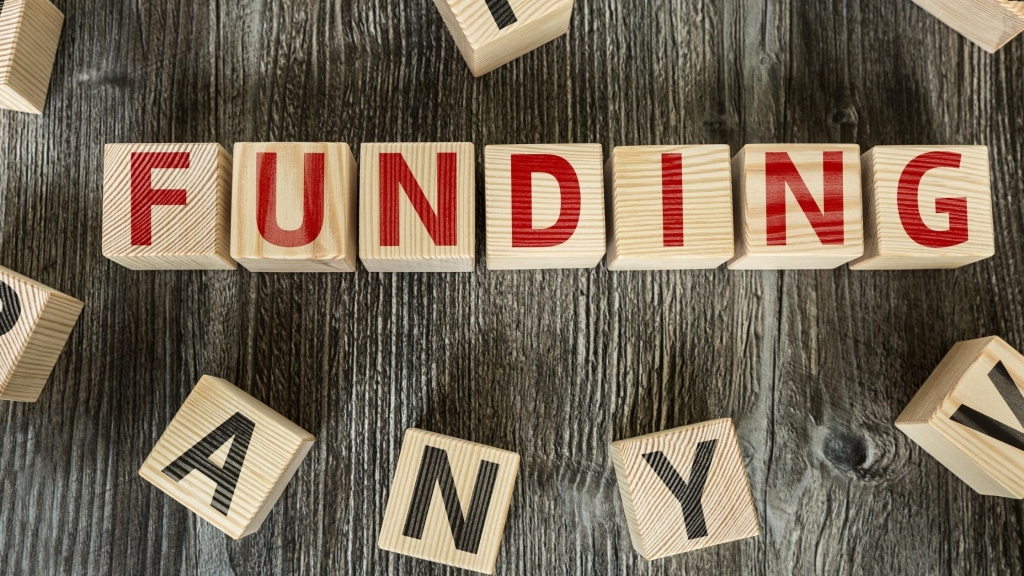
Do you expect there to be any changes in funding during the course of the project?
Specifically, you want to find out if there’s any risk that the funding associated with the project could be removed. Most often, funding bodies don’t transfer the entire monetary amount of the agreed funding up front in one lumpsum (which can be in excess of £75,000 for a 3-year studentship). Instead, payments are made in instalments and may be done so on the basis that certain milestones are met. For industry funded projects, for example, there may be a service work element (such as specialist analysis using university-based equipment) associated with the funding which will need to be delivered on time for the university to continue to receive money. In reality a complete loss of funding is unlikely to happen, but you should find out if this is at all a possibility of happening.
What is the source of the funding?
It’s important for you to understand how your project will be funded. As discussed in the previous question, the specific funder may place certain requirements on the university that need to be fulfilled to receive the funds. Don’t let this put you off applying or even impact your decision to take on the specific project, but it’s an important factor to be aware of.
Are there any opportunities to earn additional money as a PhD student?
Even if you will receive a stipend during the course of your research project, it comparatively won’t be a lot of money to live on. If you want it, the opportunity to earn extra money can make a big difference in managing your finances. This may in the form of one day/week working as a research technician or paid work preparing and delivering lectures to undergraduate students. It’s useful to know if these opportunities will exist to help you manage your expectations about your finances. Make sure you don’t let yourself feel obligated to take on this additional work however, even if it is paid; the priority will be ensuring your research progresses on schedule.
Will I have the opportunity and be expected to publish papers?

In the UK there is no requirement for you to have published any journal papers before you are awarded a PhD. Doing so however can go some way towards making your final viva that much easier, and also giving you a ‘head-start’ on your publication track record if you continue on into academia after your PhD.
You should get a sense of if your potential supervisor sees an opportunity for you to publish your research, if this is something that you want to do. Equally you should be aware of the supervisor’s expectations about publishing to avoid any potential conflict between your supervisor wanting you to publish work during your PhD and you wanting to wait until you’re in the post-doc stage before writing papers.
How many papers have previous PhD students published with you?
Knowing the answer to this should give you a good idea about the expectations and opportunities of publishing papers during your PhD. It’s certainly a positive sign to know that previous students have successfully published their research and is often a sign of a good supervisory system being in place.
How often does your research group present at academic conferences?
Having the opportunity to present your research at an academic conference is a key experience to have obtained during your time as a PhD student. Some supervisors actively encourage this and ensure that all funding applications include allocations for paying for conference related fees. Others are less convinced about the value of students going to conferences, particularly due to the additional expense of doing so, and may therefore not be as supportive of conference participation.
It’s useful to know what the norm is within the supervisor’s research group so that there are no surprises further down the line.

Is there funding support available for attending conferences?
Again, to be clear on expectations of funding and support for conference attendance, you should find out if there are funds specifically allocated for this purpose. If there aren’t, does the supervisor actively provide support to their students in applying for additional funding for this?
Are there courses and training sessions available for PhD students?
Find out if there are extra resources available to you should you want to use them. For example, do the supervisors students go on paper writing courses, or workshops on how to perform literature reviews? There are lots of new things that you’ll be doing during your PhD, especially at the beginning so it’s good to know that there’s external help available if and when you need it.
What are your past PhD graduates doing now?
This is an interesting one to find out from the supervisor. Are most of their graduates continuing their career development within academia or have many moved into industry work or even to a field completely different to their area of research? Ideally, you’d want this to align with your own career options. If most PhD holders have gone into industry whereas you want to pursue an academic career, you should try and find out why they ended up leaving academia. For example, did these graduates initially have aspirations of becoming professors themselves but were not able to do so or does your particular field normally open up more opportunities within industry?
What kind of support do you or the university provide for helping with jobs after?
In particular, what role does the supervisor play in helping their recent PhD graduates find their next job role? Do they have any connections within industry that they’d be able to help you network with? Or have any of their past PhD students stayed on in the lab as post-docs and are there resources in place for you to potentially do the same?
Will there be opportunities to teach undergraduate students?
The opportunity to give lectures to undergraduate students or lead tutorials with them can be a good way to earn some extra money during your PhD (note though that not all universities/departments formally pay PhD students to do this). Getting teaching experience is also important if you’re planning on continuing on down an academic career path at a university so it’s useful if you can gain some of this during your PhD.
Do you as a lab do any team activities together?
This will help you get a sense of the environment you’ll be working in for at least the next three years. Is this a lab with several PhD students and post-docs that make up an active ‘research family’? Does the team ever go out for lunch together or day trips away together to unwind? This can be a great way to build a sense of comradery in a research job that can often feel like you’re working alone in. Some supervisors actively encourage and get involved in nurturing a team environment whilst others are more hands-off, leaving the students to do their own thing.

What is the work environment like? Do students work in a shared office space?
Be clear on what your daily workspace will be like at the lab and university. Do all PhD students sit together in an open space or are there smaller office spaces for one or two students to work in? Some people prefer the buzz of an open space whilst others like the quiet of lone working. Either way, you should know what your work environment will look like for the next three years and plan accordingly (e.g. buy some noise cancelling headphones if you need some quite time in the open plan office).
I’ve given you a number of different questions to think about and ask your potential supervisor at your PhD interview. Not all of them may be relevant, or even appropriate to ask, so do think carefully about which ones you do want to bring up at the interview and which answers you could find out independently by either speaking to other students or looking online. Your research project and your experiences at the university will be so much more enjoyable if you can make sure you and your supervisor are a good fit for each other. The best way to do this is to ask questions!

Learn more about using cloud storage effectively, video conferencing calling, good note-taking solutions and online calendar and task management options.

Starting your PhD can feel like a daunting, exciting and special time. They’ll be so much to think about – here are a few tips to help you get started.

You’ve impressed the supervisor with your PhD application, now it’s time to ace your interview with these powerful body language tips.
Join thousands of other students and stay up to date with the latest PhD programmes, funding opportunities and advice.

Browse PhDs Now
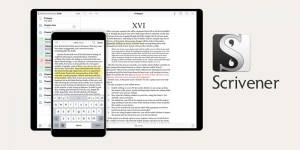
Find out how you can use Scrivener for PhD Thesis & Dissertation writing to streamline your workflow and make academic writing fun again!

This post explains the difference between the journal paper status of In Review and Under Review.

Sabrina’s in the third year of her PhD at The University of Adelaide. Her esearch combines molecular techniques, data analysis, and next generation sequencing to investigate modifications on RNAs in plants.

Bijou is a second year MD-PhD candidate, starting her second year of medical school. At the end of this academic year she’ll transition into doing a genetics PhD full time at Case Western Reserve University.
Join Thousands of Students
- Home »
- Advice »
- Studying For A PhD
find your perfect postgrad program Search our Database of 30,000 Courses
Dos and don’ts of a phd interview.
Studying for a PhD is an amazing academic achievement, as well as serious time commitment , and it's certainly not one for the faint-hearted. Once you've decided to embark on this academic path, your PhD interviewer needs to be sure that you are able to rise to the challenge and are academically capable of achieving this ultimate goal. And the PhD interview is how they assess your potential for a place on the program when applying for a PhD .
Your PhD interview will consist of questions that will enable your potential supervisors to get to know you better and have an understanding of what you’d like to study, why you’ve chosen your field of study, and whether you’d be a good fit for the PhD program.
This interview will also give you the opportunity to ask questions about the program and the university to make sure it’s the place you’d like to study.
Here, we've compiled a list of dos and don'ts of a PhD interview from the interviewer's perspective, to hopefully guarantee you success when answering the PhD interview questions and thus beginning your Doctorate journey.
PhD interview questions to help you prepare
Your interviewers will ask a range of different questions in order to determine whether you will be let into the PhD program . They will ask different types of questions to get an idea of who you are, what your interests are, and how much of an asset your research will be to the university.
General PhD interview questions
One important aspect of the PhD interview is for the interviewers to get a good idea of who the interviewee is.
They will do this by asking a series of questions that are more general to try and get a sense of your likes and dislikes, and your overall personality. These opening questions could be viewed as ‘warm up questions’ and are likely to also include questions and discussions about your academic history, reasons why you are interested in your particular research topic, and why you’re studying a PhD.
Example questions could include:
- What is your academic background?
- Describe your personal qualities?
- What sets you apart from the candidates?
- What are your strengths and weaknesses?
The PhD interviewer will ask you questions about your motivation to study a PhD which you should find straightforward to answer as you clearly have a keen interest and knowledge in a particular research topic to be considering it at PhD level. Now all you need to do is illustrate to the interviewer why you are the right person for this PhD at their university.
The first way to do this is to go into detail about your personal motivations for studying a PhD. Do you have a historical or family link with this topic? Was it an area you covered in your bachelors degree that you now want to explore further? Are you destined for a career in academia?
Another thing you should demonstrate in your PhD interview is what experience you’ve had either academically, personally or in the workplace that has strengthened your passions for your research.
It is also important to show that you have researched the university, the supervisor and your project. If many universities offer this particular PhD course, then why did you choose this specific one? Do they have resources that will be useful? Is there a supervisor you’d like to work with?
Example questions that you can expect to receive at this stage in your PhD interview could include:
- Why are you motivated to pursue a PhD and why in this specific field?
- Why did you choose this university?
- Why did you choose this program?
- Tell us about a time you experienced a setback
Relevant experience
Your PhD interviewer will be interested in any relevant experience you have to qualify you to study this PhD. Use your answers to draw attention to your specific qualifications that may not be obvious from your CV or project. Discuss other courses that you’ve taken, past research, etc. Use this time to reassure your prospective supervisor that you have the skills and experience needed to undertake a doctorate.
Consider what is the critical knowledge and skills needed for this project and explain to the interviewer how you meet these.
Don’t just summarise your CV as the interviewer has already seen this. They will want to see your passion and motivation for your research project.
Example questions they may ask at this stage could be:
- What experience do you have that makes you suitable for this particular PhD and in what ways?’
- Why should we choose you?
Your PhD project
Interviewers will want to know that students understand their project and the research involved in successfully studying a PhD.
You should be prepared to discuss your project idea in detail and demonstrate to the interviewer that you are the ideal candidate. For example, you should explain that you understand the current gaps in knowledge around your topic and how you propose to fill these gaps. Show that you know what your aims and objectives are and how your efforts will contribute to the research field.
Here are some example questions to help you discuss your PhD project:
- How are you planning to deliver your project on time?
- What will you do if you do not find the expected results?
- What difficulties would you expect to encounter during this project?
- How did you develop this proposal?
Future ambitions
It’s important for students to know where their work may lead them. Knowing how a PhD will help achieve this, and articulating these aspirations to the interviewer, will give the interviewer a better picture of the student’s goals.
If the goal is to have an academic career, use this as an opportunity to show the interviewer that you understand the academic career path.
An example question at this stage could be:
- How will this PhD open the door for future ambitions and aspirations?
Your own questions
As well as being properly prepared to answer questions about your PhD proposal, it is also important to ask your own questions to the interviewer to make sure that this is the university and PhD program that you’re looking for.
Example questions that you could ask a potential supervisor could include:
- Are you likely to remain at the university for the duration of my PhD program?
- Are there good links within a specific industry/work field for your post-PhD career?
- How many PhD students to you supervise at one time?
- How much contact time am I likely to get?
PhD interview questions: DOs
- "Brand" yourself. Show your personality . We must remember you for something besides your academic skills.
- Be confident and sure of your abilities, but don’t be overconfident. You are not the best in everything that you do, so don't pretend you are!
- If we ask you a witty question, reply with a witty answer.
- All PhD interviews are different. Be flexible when preparing for your interview and don’t take anyone’s advice as definite, instead use it to build upon.
- Avoid simple yes or no answers.
- Show that you are an independent and original thinker by engaging in debate and supporting your arguments with reasonable statements. However, always be polite and argue without insulting us.
- Be professional. Professionals can find the right measure between being serious and being informal.
- Show that you care about what you want to study and about what we do, and don’t be interested in our PhD program just to get the title.
- Research what we do. We don’t want to talk to someone who knows nothing about our work.
PhD interview questions: DON'Ts
- Don’t undermine the importance of 'soft' general questions like “Where do you see yourself in future?” or “What is motivating you to do the PhD?”
- Don't be passive in communication. We are interviewing you, but you are also interviewing us.
- Don’t give too general answers. Be specific and to the point because that will show us that you are not feigning but you know what you are talking about.
- Don’t get nervous if you think the interview is not going well. In many cases this is just your personal impression, which may be wrong.
- Don’t come dressed as if you just woke up – make an effort!
- Don’t talk jargon. It is not very likely that we were born in the same place or have the same background, so we may not understand what you are saying.
- Don’t try to pretend that you are someone you're not. We don’t like pretentiousness and can usually see straight through it.
- Don’t try to be too funny. We may have a different sense of humour than you do, especially if you come from a different culture.
- Don’t become too emotional during the PhD interview. Enthusiasm is good but not if it’s exaggerated, then it becomes quite off-putting.
Summary of PhD interview questions
This table shows some examples of different categories of questions you might enounter at a PhD interview.
Related articles
Applying For A PhD
How To Prepare For A PhD Viva
Are You Ready For A PhD?
How To Get The Most From Your PhD Supervisor
Common PhD Myths
Alphabet of PhD Study
Postgrad Solutions Study Bursaries

Exclusive bursaries Open day alerts Funding advice Application tips Latest PG news
Sign up now!

Take 2 minutes to sign up to PGS student services and reap the benefits…
- The chance to apply for one of our 5 PGS Bursaries worth £2,000 each
- Fantastic scholarship updates
- Latest PG news sent directly to you.
PhD Interview Questions and Answers (13 Questions + Answers)

Most PhD applications include an interview. This allows your university (and perhaps even your prospective supervisor) to discuss the PhD with you in more detail.
This article lists some of the most common PhD interview questions along with their answers. The goal is to help you prepare for a PhD interview and pass with flying colors.

1) How did you develop this proposal?

When responding to this question, demonstrate your thought process, research skills, and the evolution of your ideas. Let's choose the subject of "Renewable Energy Integration in Urban Planning" as an example.
Sample answer:
"My proposal on 'Renewable Energy Integration in Urban Planning' originated from my undergraduate thesis on sustainable cities. Intrigued by the potential of renewable energy in urban environments, I conducted a literature review to identify gaps in current research. This review highlighted a lack of comprehensive strategies for integrating renewable technologies at a city-wide level. I then consulted with experts in urban planning and renewable energy, which provided practical insights into the challenges and opportunities in this field. I designed a methodology that combines spatial analysis with energy modeling to explore optimal renewable energy integration in urban landscapes. This proposal represents an amalgamation of academic research, expert consultation, and innovative methodology development."
This answer is effective because it mentions a literature review demonstrates the ability to conduct thorough research and identify gaps in existing knowledge.
2) Why do you wish to pursue a PhD?
For this question, it's important to articulate your passion for the subject, your long-term career goals, and how the PhD program aligns with these aspects.
Let's choose the subject of "Artificial Intelligence in Healthcare" for this example.
"I am passionate about leveraging technology to improve healthcare outcomes, and pursuing a PhD in Artificial Intelligence in Healthcare aligns perfectly with this passion. During my Master's, I was fascinated by the potential of AI to revolutionize diagnostic processes and personalized medicine. I believe a PhD will provide me with the deep technical knowledge and research skills necessary to contribute significantly to this field. My goal is to develop AI systems that enhance medical diagnostics, ultimately improving patient care and treatment efficiency. This PhD program, known for its pioneering research in AI and strong healthcare collaborations, is the ideal environment for me to develop these innovations and achieve my career aspirations in healthcare technology."
This is a great answer because you clearly state that the PhD will provide the necessary skills and knowledge, indicating a clear understanding of the purpose of the program.
3) Why do you think you are the right candidate for this PhD program?
Discuss how your research interests align with the program's strengths and the faculty's expertise. Explain how the program's resources, courses, and research opportunities can help you achieve your academic and career goals.
"I am deeply passionate about environmental science, particularly in the area of sustainable urban development. This passion was ignited during my master's program in Environmental Studies at XYZ University, where I completed a thesis on urban green spaces and their impact on city microclimates. This research not only honed my skills in data analysis and GIS mapping but also highlighted the importance of interdisciplinary approaches to environmental issues. I am drawn to your PhD program at ABC University because of its innovative research on sustainable urban planning and the renowned work of Professor Jane Smith in this field. Her research aligns with my interest in integrating green infrastructure into urban planning to mitigate climate change effects. My perseverance, attention to detail, and ability to synthesize complex data make me an ideal candidate for this challenging program. Pursuing this PhD is integral to my goal of becoming an environmental consultant, where I plan to develop strategies for cities to reduce their environmental footprint."
This response is effective because it mentions particular aspects of your experience and the program, avoiding generic statements. It also outlines how the PhD fits into your career path.
4) What do you plan to do after you have completed your PhD?
Be specific about the type of career you aspire to, whether it's in academia, industry, research, etc. Explain how the PhD will equip you with the skills and knowledge for your chosen career path.
"After completing my PhD in Computational Neuroscience, I plan to pursue a career in academia as a university professor. My doctoral research on neural network modeling will provide a strong foundation for teaching and conducting further research in this area. I aim to develop innovative courses that bridge computer science and neuroscience, addressing the growing demand for interdisciplinary knowledge in these fields. Additionally, I intend to continue my research on applying machine learning techniques to understand brain function, which has potential implications for developing new treatments for neurological disorders. This academic pathway allows me to contribute significantly to both education and research in Computational Neuroscience."
This is a great answer because it connects the PhD research directly to future career plans.
It also articulates how your work can impact both academia and the broader field of Computational Neuroscience.
5) Why have you chosen this specific PhD program?
Mention specific aspects of the program that attracted you, such as the curriculum, research facilities, faculty expertise, or reputation.
Explain how the program aligns with your research interests or academic background.
"I chose the PhD program in Artificial Intelligence at MIT because of its cutting-edge research and interdisciplinary approach, which perfectly aligns with my academic background in computer science and my passion for machine learning. The program's emphasis on both theoretical foundations and practical applications in AI is particularly appealing. Additionally, the opportunity to work under the guidance of Professor [Name], whose work in [specific area, e.g., neural networks or AI ethics] has deeply influenced my own research interests, is a significant draw. This program is an ideal fit for me to further develop my skills and contribute to the field of AI, ultimately aiming for a career in AI research and development in the tech industry."
This answer connects your background and goals to the program's offerings.
Including a specific professor's name shows detailed knowledge about the program and faculty.
6) What impact would you like your PhD project to have?
When answering this question, convey both the academic significance and the potential real-world applications of your research. Let's choose a project focused on developing eco-friendly battery technologies for electric vehicles for this example.
"My PhD project aims to develop new eco-friendly battery technologies for electric vehicles (EVs), addressing both the environmental impact of battery production and the efficiency of energy storage. I hope my research will contribute to the academic field by advancing our understanding of sustainable materials for energy storage, potentially leading to publications and patents. Beyond academia, I envision this project significantly impacting the EV industry by providing a more sustainable and efficient battery alternative. This innovation could play a crucial role in reducing the carbon footprint of transportation and supporting global efforts towards a greener future. Ultimately, I aspire for my work to not only advance scientific knowledge but also drive real-world changes in how we approach energy sustainability in transportation."
This is an excellent answer because it connects the project to larger environmental goals and societal benefits. It also reflects a forward-thinking approach, demonstrating your understanding of the project's potential long-term implications.
7) What difficulties would you expect to encounter during this project?
It's important to demonstrate awareness of potential challenges and convey a proactive mindset toward problem-solving. Let's choose a project focused on the development of a novel AI-driven diagnostic tool for early detection of neurological diseases for this example.
"In developing an AI-driven diagnostic tool for early detection of neurological diseases, I anticipate several challenges. Firstly, the accuracy and reliability of the tool depend heavily on the quality and diversity of the data used for training the AI algorithms. Obtaining a comprehensive dataset that adequately represents the population can be difficult due to privacy concerns and data availability. Secondly, ensuring the AI model's interpretability to be clinically useful while maintaining high performance is another challenge, given the complexity of neurological diseases. To address these, I plan to collaborate with interdisciplinary teams, including data privacy experts and neurologists, to source and utilize data ethically and effectively. I also intend to continuously refine the AI model, focusing on both its predictive accuracy and clinical applicability. These challenges, while significant, present valuable opportunities for innovation and interdisciplinary collaboration."
This response is effective because it clearly outlines realistic challenges specific to the AI diagnostic tool project. It also presents a proactive approach to overcoming these challenges, showing problem-solving skills.
8) How will you fund this project?
When answering this question, show that you've thought about the financial aspects of your research and are aware of funding sources that are available and applicable to your project.
"I have identified multiple funding sources to support my renewable energy research project at Stanford University. Firstly, I plan to apply for the DOE Office of Science Graduate Student Research (SCGSR) Program, which offers substantial support for projects focusing on sustainable energy. My proposal for this grant is already in progress, highlighting how my project aligns with the DOE's priorities in advancing clean energy technologies. Additionally, I'm exploring departmental fellowships at Stanford, particularly those aimed at renewable energy research. I am also keen on establishing industry partnerships, given the project's relevance to current energy challenges and the potential for collaborative funding and technological exchange. Last but not least, I will seek conference grants to present my research findings, which can lead to further academic collaborations and additional funding opportunities."
Notice how this answer mentions funding sources that align with the renewable energy focus of the project and the resources available at Stanford University.
9) Tell us about a time you experienced a setback
Focus on a situation relevant to your academic or research experience. Let's use a real-world example where a research experiment failed due to unexpected variables.
"During my Master’s thesis on the effects of soil composition on plant growth, I faced a major setback. My initial experiments, which involved growing plants in different soil types, failed to produce consistent results due to unanticipated environmental variations in the greenhouse. This was disheartening, especially as the deadline approached. However, I responded by reassessing my experimental setup. I consulted with my supervisor and decided to control more variables, such as humidity and temperature. I also refined my data collection methods to include more frequent soil and plant measurements. These adjustments led to more reliable results, and I successfully completed my thesis. This experience taught me the importance of adaptability in research and reinforced the value of meticulous experimental design."
This is a great answer because it shows how you’ve encountered and overcame a specific problem, demonstrating resilience and adaptability.
10) What are your strengths and weaknesses?
When answering this question, it's important to present a balanced view of yourself, showing self-awareness and a commitment to personal development. Choose strengths that are relevant to a PhD program and weaknesses that you're actively working to improve.
"One of my key strengths is my analytical thinking, which I demonstrated during my Master's project where I developed a novel algorithm for data analysis. This required me to not only understand complex theories but also apply them creatively to solve real-world problems. As for weaknesses, I sometimes struggle with overcommitment, taking on too many projects at once. This occasionally led to stress during my undergraduate studies. However, I am actively working on this by improving my time management skills and learning to prioritize tasks more effectively. I've started using project management tools and setting clear boundaries, which has already shown improvements in my workflow and stress levels."
This answer maintains a good balance between strengths and weaknesses. It also shows self-awareness, demonstrating a proactive approach to personal development.
11) Why have you chosen to study for a PhD at this university?
Mention specific aspects of the PhD program that attracted you. Explain how your research interests align with the work being done at the university.
"I am drawn to the PhD program in Astrophysics at Caltech due to its outstanding reputation in space research and the unparalleled resources available at the Owens Valley Radio Observatory. My research interest lies in the study of exoplanets, and Caltech's active projects in this area, such as the Zwicky Transient Facility, align perfectly with my academic goals. The opportunity to work under the guidance of Professor [Name], known for pioneering work in exoplanetary atmospheres, is particularly exciting. Additionally, Caltech's collaborative environment and emphasis on interdisciplinary research are conducive to my professional growth, providing a platform to engage with experts from various fields in astrophysics."
This response directly connects your research interests with ongoing projects and facilities at Caltech. It also shows you’ve done your research on faculty members and their work.
12) What can you bring to this research group?
Focus on your unique skills, experiences, and perspectives that will contribute to the research group's success. Let's choose the field of Biomedical Engineering at Johns Hopkins University for this example.
"As a prospective member of the Biomedical Engineering research group at Johns Hopkins University, I bring a unique combination of skills and experiences. My expertise in microfluidics, honed during my Master’s research, aligns well with the group’s focus on developing lab-on-a-chip devices for medical diagnostics. I have also co-authored two papers in this field, demonstrating my ability to contribute to high-impact research. Additionally, my experience in a start-up environment, where I worked on developing portable diagnostic tools, has equipped me with a practical understanding of translating research into applications. I thrive in collaborative settings, often bringing interdisciplinary insights that foster innovative problem-solving. I am excited about the prospect of contributing to the group’s ongoing projects and introducing fresh perspectives to advance our understanding and application of biomedical technology."
This response shows your relevant expertise, ability to work in a team, and the unique perspectives you can offer, positioning you as a valuable addition to the research group.
13) Do you have any questions for us?
Asking good questions demonstrates your motivation. It also shows that you’ve given some genuine consideration to the project and/or program you’re applying to.
Some questions you can ask the interviewer include:
- What will the supervision arrangements be for the project?
- What kind of training and skills sessions are offered as part of the PhD program?
- How many other PhD students has this supervisor seen to completion?
- Are there any major developments or partnerships planned for the department?
- Are there likely to be any changes to the funding arrangements for the project?
- What opportunities will I have for presenting my research?
Remember: you’re a good student, with lots of potential. You’re considering at least three years of hard work with this university. You need to know that you’ll get on with your supervisor, that your work will be appreciated and that there are good prospects for your project.
What to wear to a PhD interview
Wear formal attire for a PhD interview. Your best bet is to wear a suit. A navy blue suit is the best and most versatile option. No matter your gender, a suit is always very professional.
For men, wear a suit with a tie, dress shirt, and dress shoes. For women, wear a suit (pantsuit or skirt suit) with a blouse, or conservative dress, and closed-toe shoes.
When in doubt, it’s better to be slightly overdressed than underdressed. The goal is to make a professional impression and feel confident, without your attire distracting from the conversation.
What to expect from a PhD interview
At its core, a PhD interview will consist of questions that allow your potential supervisors to get to know you better and have an understanding of what you’d like to study, why you’ve chosen your field of study, and whether you’d be a good fit for the PhD program.
You should expect general questions to help the interviewer get a sense of your likes and dislikes, and your overall personality.
Next, expect questions about your personal motivations for studying a PhD. Your interviewer will also be interested in any relevant experience you have to qualify you to study this PhD.
In the next section, expect questions about your PhD project. You should be prepared to discuss your project idea in detail and demonstrate to the interviewer that you are the ideal candidate.
Last but not least, the interviewer will discuss your future ambitions and give you an opportunity to ask questions. Remember that this interview goes both ways.
It’s important to ask the interviewer relevant questions to show your engagement and the serious consideration you are giving their program.
You are preparing to spend several years of your life at this school. Think about what is important to you and what would make or break your decision to attend this university.
Prepare a list of questions ahead of the interview.
Understanding the interviewer’s point of view
During a PhD interview, interviewers are typically looking for a range of traits that indicate whether you are well-suited for the rigors of a doctoral program and a research career.
These traits include:
Intellectual Curiosity and Passion: A strong enthusiasm for the subject area and a desire to contribute to and expand knowledge in the field.
Research Skills and Experience: Demonstrable skills in conducting research, including designing experiments, collecting and analyzing data, and interpreting results. Prior research experience relevant to the PhD topic is often a plus.
Resilience and Perseverance: The capacity to handle setbacks and challenges, which are common in research, and to persist in the face of difficulties.
Collaboration and Teamwork: Although PhD research can be quite independent, the ability to work well with others, including advisors, faculty, and other students, is crucial.
Self-Motivation and Independence: The drive to work independently, manage one's own project, and stay motivated over the long term.
Fit with the Program: Alignment of the candidate’s research interests and goals with the strengths and focus of the PhD program and faculty.
These traits not only indicate your readiness for a PhD program but also your potential to contribute meaningfully to their field of study and succeed in a research-oriented career.
Related posts:
- University Interview Questions (16 Questions + Answers)
- Project Manager Interview Questions (14 Specific Questions + Answers)
- Strength-Based Interview Questions (21 Questions + Answers)
- Engineering Interview Questions (15 Questions + Answers)
- Business Analyst Interview Questions (17 Questions + Answers)
Reference this article:
About The Author

PracticalPie.com is a participant in the Amazon Associates Program. As an Amazon Associate we earn from qualifying purchases.
Follow Us On:
Youtube Facebook Instagram X/Twitter
Psychology Resources
Developmental
Personality
Relationships
Psychologists
Serial Killers
Psychology Tests
Personality Quiz
Memory Test
Depression test
Type A/B Personality Test
© PracticalPsychology. All rights reserved
Privacy Policy | Terms of Use
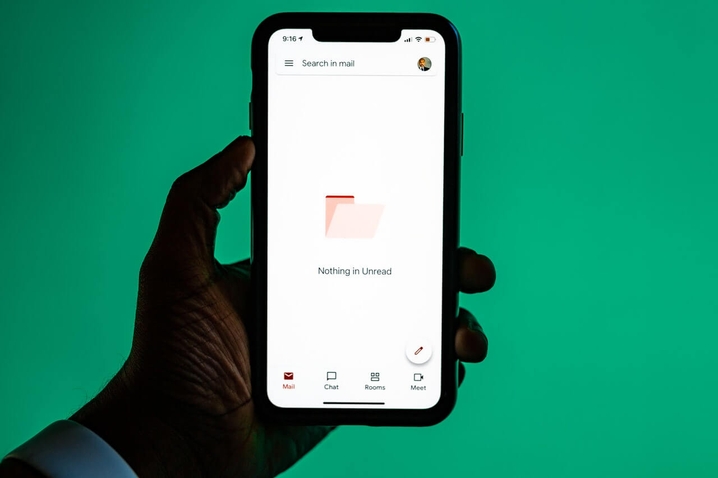
How to ask about your interview status through email
Hiring managers are busy people, and sometimes they need to be reminded that you’re waiting to hear from them. When time has passed since your job interview but the hiring manager hasn’t contacted you, it’s time to figure out how to ask about interview status through email.
In a competitive job market, you’re never the only applicant for a job, and the hiring process isn’t the only thing your interviewer has to think about. Many managers have to source candidates and interview them on top of their regular duties.
This means that they have their own schedules to keep, and you probably aren’t their top priority. They aren’t necessarily going to reach out to you in a timely manner, and if you have a question you want answered, you need to ask it.
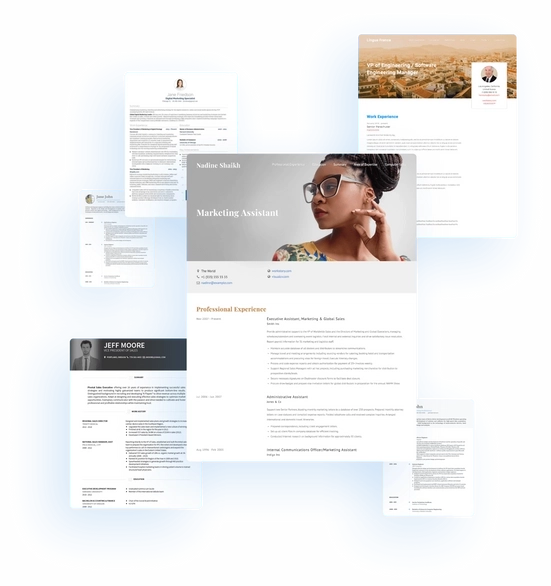
Recommended links:
- Our collection of 500+ professional resume examples .
- Our gallery of 20+ downloadable resume templates .
When you just had an interview with a company, the question you’re going to want answered most is “Did I get the job?” Of course, you shouldn’t outright ask if you’ve been hired. Instead, ask politely about the status of your application. The hiring manager should be willing to give you an update on your interview if they have one.
With that in mind, here’s how to ask for an update after your interview.
- Why ask for an update after the interview?
If you want clarity on how your application is doing, you have to ask. To the frustration of many job-seekers, many companies will simply stop contacting you after your interview instead of sending a simple rejection email. Unsuccessful candidates may never hear from the company again after their interview.
However, just because you haven’t heard from a company doesn’t necessarily mean you didn’t get the job. The hiring process is time consuming, and the hiring manager could be taking their time. They might still be doing interviews, taking in new applicants, or simply haven’t made a decision yet. Asking about interview status is often the only way to keep yourself in the loop.
Following up to ask about interview status is also an opportunity to reiterate your enthusiasm for the job. In this way, your email asking about interview status has two purposes—getting you the information you want, and improving your prospects. A follow-up message shows that you want the job and may put you ahead of the other candidates.
First impressions are important, but they fade in the memory when someone is interviewing dozens of candidates. You can keep the interviewer’s memory of you fresh (and positive) with a polite and enthusiastic email about interview status.
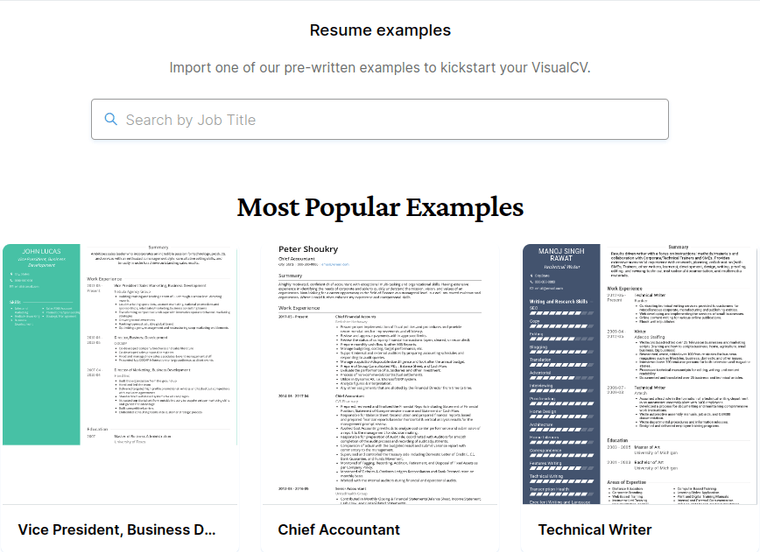
- How to request interview status through email?
Hi [Hiring manager],
I am excited to be considered for the role and it was great to speak with the team. I am following up to check on the status of my job application for [job title]. I look forward to hearing back from you on my job application whenever you have reached a decision.
Thank, [Your name]
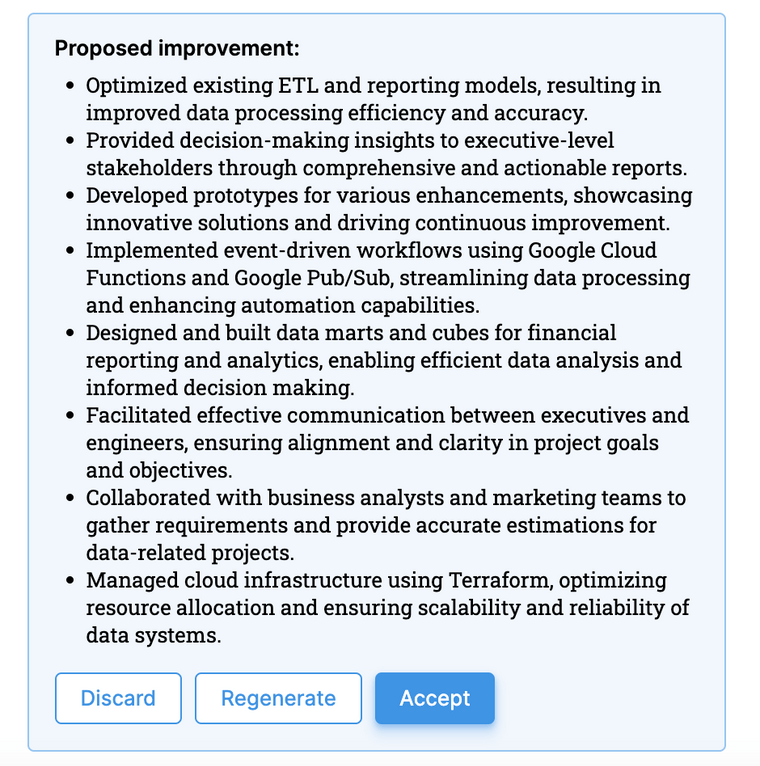
- How soon to follow up after the interview
How soon to follow up after the interview depends on your circumstances. If you were given a timeline for hearing back, wait until the deadline has passed. If you weren’t given a deadline, wait a week or so.
If you’re simply sending a thank-you email , send it right away. It’s appropriate to thank the interviewer the same day as the interview. Your thank-you email isn’t where you should ask about interview status, however. The timing of your interview status email will be trickier.
This is because it’s possible to overdo it. If you ask about your interview status too soon, they won’t be ready to answer, and if you ask too many times they will find you annoying. It’s important to strike the right balance when communicating with a potential employer.
If, during the interview, the manager gave an approximate deadline for hearing back, you should wait until that deadline has passed before you ask about interview status. Then, wait a day or two. You don’t want to seem pushy. Once a day has passed since the deadline, you can write your follow-up message.
If the interviewer didn’t give a specific deadline, wait one week before asking about your interview status. Seven days (or five business days) is enough time for them to interview a few more candidates and review their notes. This doesn’t mean that they will have made a decision already. In fact, they almost certainly haven’t. However, they might be able to give you an update, whether it’s a new deadline for their answer, an indication that you’re still being considered, or simply a rejection.
- How long to wait after the interview before giving up
As the saying goes, never give up. Just because you haven’t heard back in a week, or even a month, doesn’t mean you have no chance. The hiring process can take a long time.
However, once you’ve sent your email asking for an interview status update, you should start to focus on new applications and opportunities. Waiting around for this one job opening isn’t the best use of your time.
In fact, you should always be applying to other openings. Don’t put all your career eggs in one job basket. Throughout the entire application process you should still be applying for other positions. Even if you’re being invited back for a second and third interview, keep applying elsewhere.
You don’t have this job until you’ve signed all the papers. Just as you shouldn’t give up on this opportunity, you shouldn’t give up on the rest of your job search. Keep your options open.
- How to ask for an update after the interview
It’s important to figure out how to ask about interview status through email. The company has little incentive to reach out to you. This means that if you want information you have to ask for it, and it’s up to you to reach out in the way that will receive the best response.
With that in mind, here are some tips for asking for an interview update:
Ask about interview status through email
The best way to ask about the status of your interview is to send a simple email.
While some employers might appreciate a phone call, email is the best way to follow up. Email is the way that most companies communicate with others outside the company, and it’s what they would expect from potential future employees.
Email allows you to reach out without imposing on anyone’s time. Your email will reach the right person without having to work through a phone tree, and the recipient can respond whenever they have time.
Their response may not come as soon as you like, and it won’t have the personal touch of a phone call, but email is the best way to ask about interview status.
One follow-up email asking for an update to your interview status is usually enough. If they ignore your first email, however, another follow-up is fine. Keep it polite and professional.
Keep it brief
The actual text of your message can be tricky. You have to be firm when you ask about the information you need, while remaining polite and professional. You can’t seem too pushy, and you need to make sure the message will help your candidacy, not hurt it.
To do this, make sure that your message is short and your tone is positive. You should greet them politely, make it clear that you’re enthusiastic about the position, and ask about interview status in a professional way.
To make sure your message hits all the right notes, use this paragraph structure to write your email:
- Intro/thank-you
- Restate enthusiasm
Revisit topics from the interview
A great way to impress hiring managers with your email is to revisit topics from the interview. The interview process isn’t over until you’ve officially been hired (or rejected), and you can still show that you’re a good candidate in post-interview communications. Your follow-up email is an opportunity to demonstrate your enthusiasm for the job.
For example, if they recommended a specific book or resource, you can mention that you found it and started to use it. If they mentioned an industry influencer, tell them that you followed them or found their class. If there was a topic that you focused on in the interview, bring it up again.
This shows that you were paying attention and that you’re still working to develop your skills.
Remind them of who you are
When you thank your interviewer, be specific about what you’re thanking them for. Employers do lots of interviews, and they might not remember you as well as you remember them.
To make sure the employer doesn’t mistake you for another candidate, mention some details from your interview. For example, give the day or location of your meeting when you introduce the email:
“It was great to meet you last Thursday…”
“Thank you for meeting me at Pallet Coffee last Thursday…”
Use a relevant subject line
Include the job title or application code in the subject line of the email. This way, there will be no confusion about what interview you are referring to or what job you’re applying for.
If you can’t include it in the subject line, include it in the body of your email, ideally at the top. For example:
“Thank you for the opportunity to interview for the Customer Support Specialist position…”
Be appreciative
Your message should thank the employer for the interview. It’s important to let them know that you’re still interested in the position and that you appreciate their time.
Tell them that “I really appreciate the opportunity.” Say “thank you for your consideration,” even if you feel you weren’t given adequate consideration. Make them feel special, and let them know that you’re grateful you had a chance to interview.
In fact, your appreciation should continue even if they reject you in their response. You should never burn any bridges, and just because you didn’t get this job doesn’t mean the company won’t hire you in the future. You can even reiterate your interest in future positions:
“If there are any upcoming positions where you feel I would be a better fit, I would really appreciate the opportunity to send in an application.”
Use a template
To get started on your interview status email, you may want to use a template. This can be a helpful way to structure your email and make sure you don’t miss anything.
[Subject line]
Dear [Name of Interviewer/hirer],
[One sentence thanking them for their time.]
[A few sentences where you reference topics from the interview, or new ideas you've had since thinking about your conversation.]
[A question asking about the status of the interview]
[One or two sentences reiterating your enthusiasm and indicating that you would like to hear from them.]
Sincerely/best, [Your Name]
If you work from a template, remember that the email should still be customized , referring to topics relevant to the job or your previous conversations. It shouldn’t read like a form letter.
- How to ask about interview status through email: examples
The details of your message will depend on your circumstances. Your message will change depending on your relationship with the interviewer, your industry, and at what point of the interview process you are in. With that in mind, here are some example follow-up emails.
When you’ve already sent a thank you email
When you’ve already sent a thank-you note and the deadline you were supposed to hear back from them has passed, you can send a second email asking about your interview status. Keep it brief and polite, and make sure to restate your interest in the role.
Hi Charles,
I wanted to thank you for the interview last Monday. I enjoyed our conversation and the information you shared about your new Content Management System was very valuable.
I’m following up now to see if there are any updates regarding the status of my application.
This role looks like a great fit for me and my career goals. Anything you can share about your decision timeline or any next steps would be greatly appreciated. I am happy to provide any additional information if needed.
Again, thank you. Taylor Smith
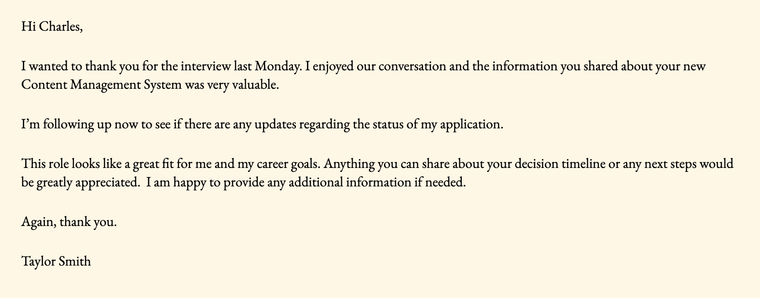
When you haven’t heard back
Once the date the company said you’d hear from them has passed, you can send your email asking about interview status. The company may not have an answer yet, but it’s acceptable to remind them that you’re waiting to hear from them.
Dear Mary Bennet,
It was a pleasure to meet you last Monday. I just wanted to follow up to see if you have made a decision regarding the Customer Success Specialist position.
I really appreciated the opportunity to learn about the role and your company, and I would love to hear any updates if you have any.
Please don’t hesitate to contact me if you have any questions or concerns. I look forward to hearing from you.
Thanks again for your time, Taylor Smith
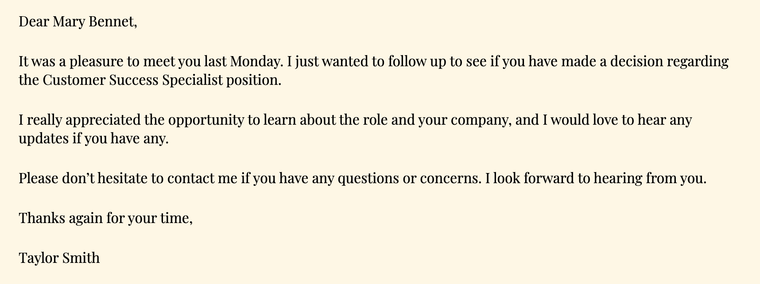
After the a second interview
Just because you’ve done a second interview doesn’t mean you have the job. Even if you’ve made it past the early stages of the hiring process, companies can cut off contact at any time. If you don’t hear back from a company after a second interview, you can still send a follow-up email to ask about your interview status.
Dear Mr Wickham,
I really appreciate your giving me the opportunity to come in for a second interview last Thursday. Our conversation about the utility of the blockchain in our industry was very interesting, and I think the Junior Business Analyst role is a perfect match for my skill set and my career goals.
If you have any updates or feedback you would like to share, please let me know. I’m very enthusiastic about this opportunity and I would love to hear back when you have a chance.

When they didn’t respond to your first email
It’s fairly likely that the first message you send won’t receive a reply. This can be discouraging, but even if another week passes without a response it’s still too soon after the interview to give up. They may just need another reminder.
Hi Mr Darcy,
I wanted to follow up regarding my previous message.
I interviewed for the open Senior Merchandiser position on Thursday, Nov 25. I really appreciate the opportunity to meet with you and I am still enthusiastic about the position. When can I expect to hear back regarding the status of my interview?
Please let me know if there are any concerns regarding my application. I’d love the opportunity to answer any questions you might have for me.
Best, Taylor Smith
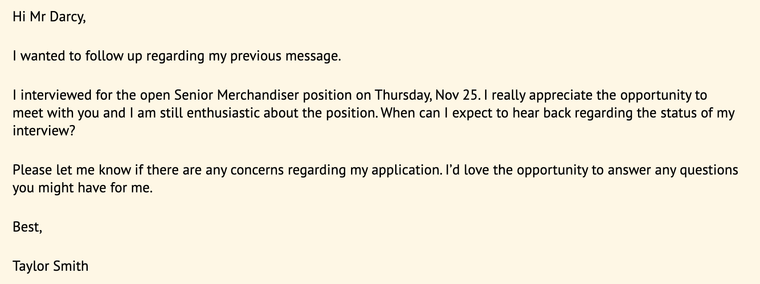
When you have an update for them
Your job search can’t stop to wait for one employer to respond. If you have an update, such as a job offer from a different company, you may want to let your interviewer know. This could be to let them know that you are withdrawing from consideration, or it could be to use the job offer as a negotiating tactic.
Hi Catherine,
I wanted to thank you for the opportunity to interview for the Customer Success Manager position last Monday.
Since our meeting, I have received an offer for a similar position at a different company. While their offer is appealing, I am especially interested in the work your company is doing and I would love to hear back from you before I respond to their offer.
Please let me know if there are any updates regarding the status of my application.
I am very enthusiastic about the prospect of working with you and if there are any concerns I could clear up, don’t hesitate to reach out.
Thanks, Taylor Smith
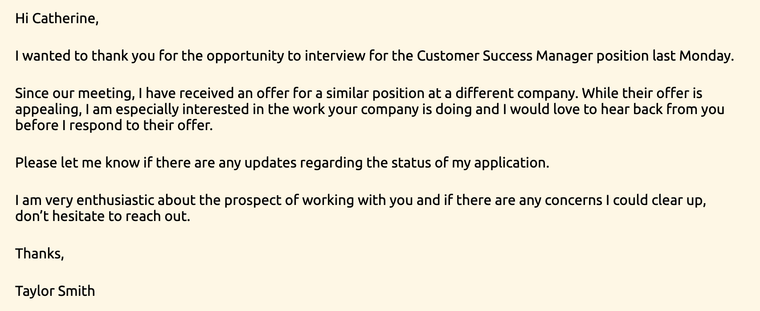
Community Success Manager & CV Writing Expert
Ben is a writer, customer success manager and CV writing expert with over 5 years of experience helping job-seekers create their best careers. He believes in the importance of a great resume summary and the power of coffee.

The top hiring and human resource statistics for 2024, including data on AI resumes, job interviews, remote work, and recruiting.
December 8, 2023
Make sure you have all the CV basics with this CV checklist.
August 23, 2021
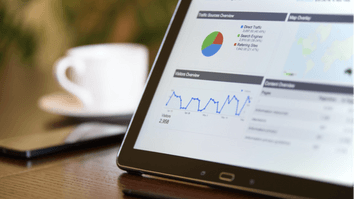
Your technical skills are an important part of what makes you a great candidate. Here's how you should display your technical skills on your resume.
December 14, 2022
Copyright © 2024 Workstory Inc.
Select Your Language:
You are using an outdated browser. Please upgrade your browser to improve your experience.
Graduate School Admission Results
About 880,631 results
Education, Clemson University
Added on May 19, 2024
MRC LMS, Imperial College London
Film and moving image studies, concordia university (canada) 1a/0p/11r. it really just takes one..
Added on May 18, 2024
Biochemistry, Drexel University Ignore status -- has anyone heard back from Drexel for BHAD PhD program ??
Geography, university of florida my application was rejected due to the new florida state law., psychology in education, columbia university well this sucks.
Added on May 17, 2024
Education Policy, University Of Illinois
Applied chemical science and technology, university of washington.
Added on May 16, 2024
Physics, University Of Delaware Literally just received my rejection email from the University of Delaware, I've assumed I hadn't gotten in for probably a month now since this has come so late. Would have been nice if they could have told me sooner.
Raymondbug, colby college, history, cornell university, social work, california state university long beach, engineering and science education, clemson university, chemistry, georgia state university applied for phd, got acceptance for ms. does anyone know if the department offers tuition waivers and assistantship stipends in this case, neural and behavioral sciences, suny downstate health sciences university, biomedical engineering, university of southern california, oise, university of toronto, product development engineering, university of southern california no test scores submitted. gpa under 3.0; however, work experience and projects related to major made up for it. i applied in february, philosophy, institute of oppressed minds got punished by the dept head for sending fine's highlighted texts. must have caused a brain aneurysm., east asian studies, yale university.
Results 1 - 20 of 880631
Popular Programs
The gradcafe blog.

Grad Trends: Interest in Artificial Intelligence Surges

Breaking Records: Yale Sees Most Selective Grad Admissions Season Yet

Applying to Big Tech This Year? Here’s How to Ace It.

12 Best Laptops for Computer Science Students
Signup to our newsletter, got more comments.
Please let us know what you think on the Forum or Email us.
Find a problem?
Just Report a problem to us
Email notifications
Sign up to get email alerts on new admissions for this search.
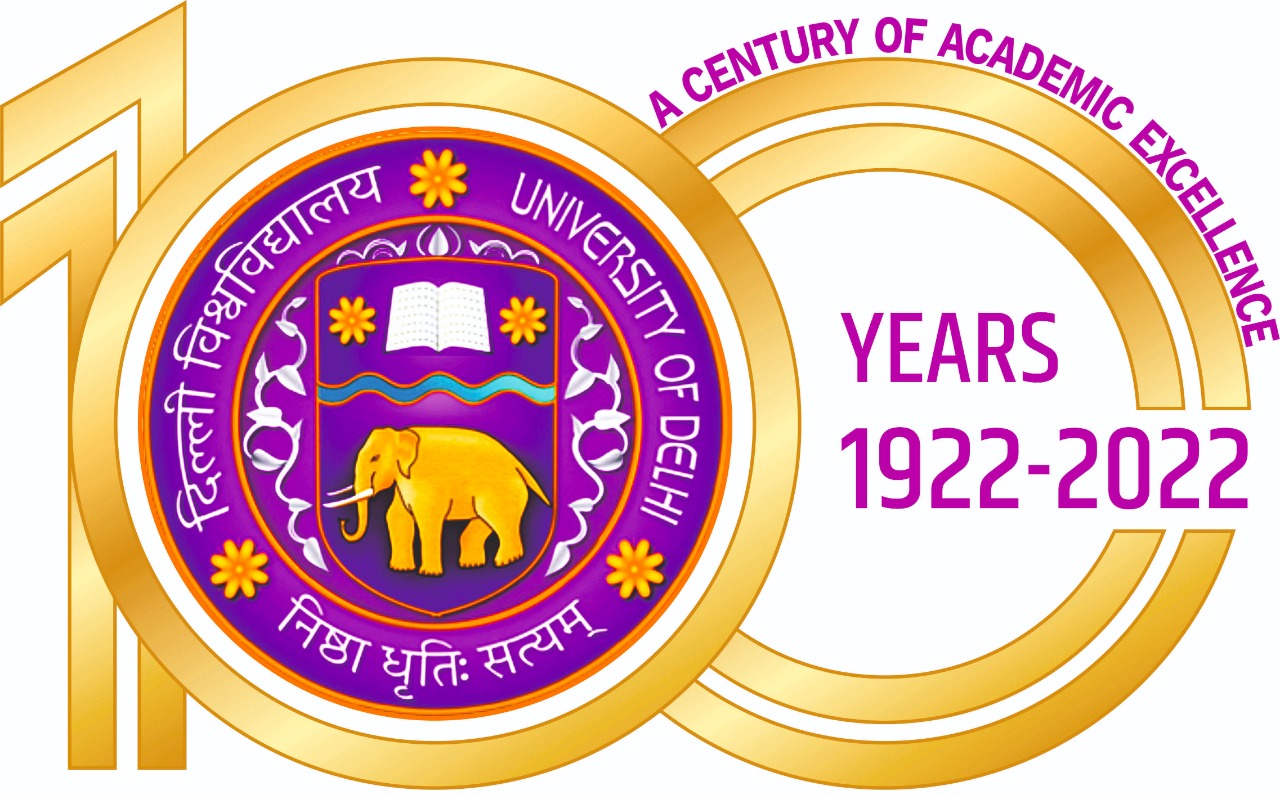
University of Delhi --> Admission 2022 -->

Admission 2022

Register : Ph.D. - https://phd2023.uod.ac.in/ | Register : Postgraduate - CSAS | Register : Undergraduate - CSAS
Ph.d. admissions.
PhD Admissions 2022-23 - Last Date Extension till 31.03.2023
- Ph.D. admission schedule Phase III academic session 2023-24
- Notice regarding extension of Ph.D. admissions under Phase - II
- Notice regarding last date of Ph.D. admissions under Phase - II
- Department of African Studies - Notice regarding Ph.D. Phase II Admission
- Public Notice - Extension of Last Date of Registration for Ph.D. Phase II Admission
- Department of English - Notice regarding number of PhD seats and seat matrix for the II Phase of PhD Admissions, 2023-24
- Public Notice - Ph.D. Admission Schedule - 2023 for Ph.D. Phase ll
- Department of Environmental Studies - Result of the interview and Admission List for 2023-24 (Phase I)
- Department of Political Science - Notice regarding increase in seats for PhD Admission 2023-24
- Department of Political Science - Notice regarding the list of selected candidates for PhD Admission 2023-24 [Phase-I]
- Department of English - Additional Second Provisional List of candidates selected for PhD admissions, 2023-24
- Department of English - Notice for Second Provisional list of applicants selected for PhD admissions, 2023-24 (Phase I)
- Department of Modern Indian Languages and Literary Studies - Ph.D. admission list for 2023-24
- Public Notice - Regarding intimation of date sheet and correction in Ph.D. Entrance Test - 2023
- Corrigendum - Regarding the seats bifurcation in Ph.D. ( Department of Fine Arts )
- Corrigendum - For Interview Schedules for PhD Admissions, 2023-24 [Phase-I](Department of Political Science)
- FMS Ph.D. 2023 Admission List of Provisionally Selected Candidates
- FMS Ph.D. 2023 Admission List and Waiting list All Category
- Corrigendum - Regarding the seats bifurcation in Ph.D. (Department of Music) 2023-24
- Link of Syllabus of PhD:- https://phd-entrance.samarth.ac.in/index.php/site/syllabus
- FMS Ph.D. Notice and Interview Schedule 2023
- Public Notice - Inviting Online Applications for Ph.D. Entrance Test for DU, JNU, BHU and BBAU - 2023
- Ph.D. Admission : Extension of Last Date of Registration
- Corrigendum : Ph.D. Programmes in Faculty of Medical Sciences
- Addendum: Ph.D. in Faculty of Medical Sciences
- Corrigendum: Ph.D. Admissions ( Department of Germanic and Romance Studies) 2023-24
- Addendum-Ph.D. Admission in Faculty of Management Studies
- Ph.D. Registration Link: https://phd2023.uod.ac.in/
- Bulletin of Information
- Notices/Announcements
Print view | Sitemap | Kontakt | Datenschutz | Impressum | Login -->
CMSimple_XH | Template by fhs --> Copyrights @ University of Delhi
» Sitemap

- हिन्दी │ Eng
Announcement
Tele manas- a toll-free helpline for students, ssp account creation link: https://ssp.postmatric.karnataka.gov.in/ca/.

- BTech Aeronautical Engineering: Course & Admission 2024 | MIT
- “Bad practice in Medicine must be rooted out,” World Medical Education President Prof David Gordon tells graduating students
- KMC Manipal moves up, MCOPS retains place in QS World Ranking by Subject 2018.
- Research Advisory Council
- List of Student Clubs | Manipal Academy of Higher Education (formerly, Manipal University)
- Vision and Mission
- Institute of Eminence (IoE)
- Ombudsman Details
- Administration
- Gender Sensitization
- Anti Ragging Policy
- Corporate Relations
- Caution notice
- Mandatory Disclosure
- Back to Campus AV
- Fee Notifications - Seniors
- Around Campus
- Around Manipal
- Student Affairs
- Campus Tour
- Student Feedback on Services at MAHE
- Sports and Fitness
- International Collaborations (OIAC)
- Centres Established under MAHE
- Innovation & Entrepreneurship
- Ranking & Recognition
- Destination Manipal
- Industry Partnership
- Green Manipal
- Research Groups
- Social Impact
- 31st Convocation
- W20-MAHE-Knowledge Partnership
- NEP 2020 implementation at MAHE
- Conferences etc
- MAHE Annual Reports
- MAHE Convocation Reports
- MAHE Silver Jubilee Newsletter
- Manipal Matters
- e-Content Development Facilities
- Grievance Redressal
- International Faculty Members
- Undergraduate (UG)
- Postgraduate (PG)
- Post Master's
- Super Speciality (SS)
- Integrated Programme
- Lateral Entry Admissions
- Post Graduate (PG) Diploma
- Advanced PG Diploma
- Certificate
- PG Certificate
- Executive Diploma
- Programs Offered
- Indian / Domestic
- International
- Eligibility & Admission Process
- Entrance Exams
- Dates To Remember
- Fees & Refunds
- Scholarships & Financial Aid
- Study In India (SII)
- Spot Admissions
- New Programs 2024
- MAHE Online Programs
- MAHE Webinars
- Admissions 2024
- Download Prospectus
- Public Advisory
- CoVid 19 Circulars
- Admissions Webpages Help
- Kasturba Medical College (KMC) Manipal
- Kasturba Medical College (KMC) Mangalore
- Centre for Integrative Medicine & Research (CIMR) Manipal
- Manipal College of Dental Sciences (MCODS) Manipal
- Manipal College of Dental Sciences (MCODS) Mangalore
- Melaka Manipal Medical College (MMMC) Manipal
- Manipal Institute of Regenerative Medicine (MIRM) Bengaluru
- Department of Basic Medical Sciences (DBMS) Manipal
- Manipal College of Pharmaceutical Sciences (MCOPS) Manipal
- Manipal College of Health Professions (MCHP) Manipal
- Manipal School of Life Sciences (MSLS) Manipal
- Manipal College of Nursing (MCON) Manipal
- Prasanna School of Public Health (PSPH) Manipal
- Manipal Institute of Virology (MIV) Manipal
- Manipal Tata Medical College (MTMC) Jamshedpur
- Manipal Centre for Biotherapeutics Research (MCBR) Manipal
- International Centre for Health Sciences (ICHS)
- Manipal Institute of Technology (MIT) Manipal
- Manipal School of Information Sciences (MSIS) Manipal
- Department of Sciences (DSc) Manipal
- Manipal School of Architecture & Planning (MSAP) Manipal
- Department of Design (DOD) Manipal
- Department of Atomic & Molecular Physics (DAMP) Manipal
- Manipal Institute of Management (MIM) Manipal
- Dept of Commerce (DOC) Manipal
- Welcomgroup Graduate School of Hotel Administration (WGSHA) Manipal
- Manipal Centre for Natural Sciences (MCNS) Manipal
- International Centre for Applied Sciences (ICAS) Manipal
- Manipal Institute of Technology (MIT) Bengaluru
- Srishti Manipal Institute of Art, Design and Technology (SMI) Bengaluru
- Manipal Institute of Communication (MIC) Manipal
- Manipal Centre for Humanities (MCH) Manipal
- Manipal Centre for European Studies (MCES) Manipal
- Gandhian Centre for Philosophical Arts & Sciences (GCPAS) Manipal
- Department of Library & Information Science (DLIS) Manipal
- Department of Philosophy (DoP) Manipal
- Department of Languages (DoL) Manipal
- Dept of Geopolitics & International Relations (DGIR) Manipal
- Directorate of Online Education
- Certificate Courses
- Certificate course in Restorative Dentistry
- Certificate in Fashion Design: Course, Admission 2022 | MSAP
- Certificate Course in Panchakarma Technician & Massage Therapist
- Certificate Course - Animation Technology
- Clinical and Diagnostic Virology
- Allied Health Sciences
- B.Sc. (Physician Assistant)
- B.Sc. Cardiovascular Technology
- B.Sc. Cardiovascular Technology - Get complete Details of B.Sc. Cardiovascular Technology...
- B.Sc. Exercise and Sports Sciences
- B.Sc. Health Information Management
- B.Sc. Medical Imaging Technology
- B.Sc. Medical Laboratory Technology
- B.Sc. Renal Replacement Therapy & Dialysis Technology
- Bachelor in Prosthetics and Orthotics
- Bachelor of Occupational Therapy: Course, Admission | MCHP
- Bachelor of Optometry
- Bachelor of Optometry: Course, Fees, Admission | MCHP
- Bachelor of Physiotherapy (Mangalore): Admission | MCHP
- Bachelor of Physiotherapy: Course, Admission | MCHP
- BASLP (Mangalore): Course, Eligibility, Admission 2022-23 | MCHP
- BASLP: Course, Eligibility, Fees, Admission | MCHP
- BSc Anaesthesia & Operation Theatre: Course, Admission | MCHP
- BSc Clinical Nutrition & Dietetics: Course, Admission | MCHP
- BSc CVT (Mangalore): Course, Eligibility, Admission | MCHP
- BSc Emergency Medicine Technology: Course, Admission | MCHP
- BSc Exercise and Sports Science: Course, Admission | MCHP
- BSc Health Information Management: Course, Admission | MCHP
- BSc Medical Laboratory Technology: Course, Admission | MCHP
- BSc MIT (Mangalore): Course, Eligibility, Admission | MCHP
- BSc MIT - B.Sc. Medical Imaging Technology
- BSc Nuclear Medicine Technology: Course, Admission | MCHP
- BSc Perfusion Technology: Course, Admission | MCHP
- BSc Psychology: Course, Eligibility, Fees, Admission | MCHP
- BSc Radiotherapy Technology: Course, Admission | MCHP
- BSc Respiratory Therapy (Mangalore): Course, Admission | MCHP
- BSc Respiratory Therapy: Course, Fees, Admission | MCHP
- BSc RRT & DT (Mangalore): Course, Fees, Admission | MCHP
- BSc RRT & DT: Course, Eligibility, Fees, Admission | MCHP
- BSc RTT (Mangalore): Course, Eligibility, Admission | MCHP
- B. Arch: Course, Eligibility, Fees, Admission | MSAP
- B.Sc Physics: Course, Fees, Admission | DAMP Manipal
- B.Com (Business Process Services): Admission | DOC Manipal
- B.Com (Hons.) - Banking & Finance
- B.Com (Hons.) - Business Analytics
- B.Com (Hons.) - Corporate Accounting
- B.Com (Professional): Course, Admission | DOC Manipal
- BDS (Bachelor of Dental Surgery): Course, Admission 2022 | MMMC
- BDS - Bachelor of Dental Surgery
- B. Des Fashion Design: Course, Fees, Admission | MSAP
- B. Des Interior Design: Course, Fees, Admission | MSAP
- B.Des Fashion Design
- B.Des Interior Design
- B. Tech (Cyber Physical systems)
- B.Sc. Applied Science (International Transfer Program in Engineering): Course, Fees,...
- BTech (Computer Science & Engineering - Cyber Security)
- BTech (Computer Science & Engineering - Data Science)
- BTech (Computer Science & Engineering - Artificial Intelligence)
- BTech Aeronautical Engineering: Course & Admission | MIT
- BTech Artificial Intelligence & Machine Learning: Admission | MIT
- BTech Automobile Engineering: Admission Process, Eligibility, Fees
- BTech Biomedical Engineering: Course & Admission | MIT
- BTech Biotechnology: Course & Admission | MIT
- BTech Chemical Engineering: Course & Admission | MIT
- BTech Civil Engineering: Course & Admission | MIT
- BTech Computer & Communication Engineering: Admission | MIT
- BTech Computer Science & Engineering
- BTech Computer Science Engineering: Course & Admission | MIT
- BTech Data Science Engineering: Course & Admission | MIT
- BTech Electrical and Electronics Engineering (EEE): Admission | MIT
- BTech Electronics & Communication Engineering
- BTech Electronics and Communication Engineering: | MIT
- BTech Electronics and Instrumentation Engineering: Admission | MIT
- BTech Industrial Engineering : Course & Admission | MIT
- BTech Information Technology
- BTech IT (Information Technology): Course & Admission | MIT
- BTech Mechanical Engineering: Course & Admission | MIT
- BTech Mechatronics Engineering: Course & Admission | MIT
- BA Culinary Arts: Course, Fees, Admission | WGSHA
- BHM: Course, Eligibility, Fees, Admission | WGSHA
- B.A. (Hons.) English
- B.A. (Hons.) History & Economics
- B.A. (Hons.) History & Political Science
- B.A. (Hons.) History & Sociology
- B.A. (Hons.) Political Science & Economics
- B.A. (Hons.) Political Science & Sociology
- B.A. (Hons.) Psychology
- B.A. (Hons.) Psychology - Course Structure
- B.A. (Hons.) Sociology & Economics
- BA Humanities
- Undergraduate Program (B.Des.)
- Undergraduate Program (BFA)
- Undergraduate Skill-Based Vocational Program (B.Voc)
- BA (Hons.) European Languages and Intercultural Studies
- B.Com LLB (Hons)
- BA LLB (Hons)
- BBA LLB (Hons)
- BSc Biotechnology
- BSc Biotechnology Honors
- BBA: Course, Eligibility, Fees, Admission | DOC Manipal
- B.A. (Hons.) Journalism and Mass Communication
- BA Honours - Media & Communication
- BSc Animation Course
- BVoc in Graphics and Digital Media
- MBBS - Bachelor of Medicine & Bachelor of Surgery
- MBBS: Course, Eligibility, Fees, Admission 2022 | MMMC
- Student Mobility Center
- UG - Electives
- BSc Nursing
- Post Basic B.Sc. in Nursing
- BPharm (Bachelor of Pharmacy): Course, Admission | MCOPS
- PharmD (Doctor of Pharmacy): Course, Admission | MCOPS
- BA in Aesthetics and Peace Studies
- BA Public Policy and Administration
- Diploma in Dental Hygienist
- Diploma in Dental Mechanic
- Diploma in Dental Operating Room Assistant
- DPharm: Course, Eligibility, Fees, Admission | MCOPS
- MSc Applied Mathematics & Computing: Admission | DSc Manipal
- MSc Chemistry: Course, Admission | DSc Manipal
- MSc Geology: Course, Admission | DSc Manipal
- MSc Physics: Course, Admission | DSc Manipal
- M.Optom (Master of Optometry): Course, Admission | MCHP
- M.Sc Renal Replacement Therapy & Dialysis Technology
- M.Sc. (Anaesthesia & Operation Theatre Technology)
- M.Sc. (Emergency Medical Technology)
- Master of Physiotherapy (MPT) (Manipal)
- M.Sc. Clinical Psychology (at Mangalore)
- M.Sc. Echocardiography
- Master of Occupational Therapy: Course, Admission | MCHP
- MSc Audiology (Mangalore): Course, Admission | MCHP
- MSc Audiology: Course, Eligibility, Fees, Admission | MCHP
- MSc CCIT - M.Sc. Cardiac Catheterization & Intervention Technology
- MSc CCIT: Course, Eligibility, Fees, Admission | MCHP
- MSc Clinical Psychology: Course, Fees, Admission MCHP
- MSc Echocardiography: Course, Fees, Admission | MCHP
- MSc Exercise and Sports Science: Course, Admission | MCHP
- MSc Health informatics: Course, Fees, Admission | MCHP
- MSc Health Information Management: Course, Admission | MCHP
- MSc Medical Imaging Technology: Course, Admission | MCHP
- MSc Medical Laboratory Technology: Course, Admission | MCHP
- MSc Medical Radiation Physics: Course, Admission | MCHP
- MSc Nuclear Medicine Technology: Course, Admission | MCHP
- MSc Perfusion Technology: Course, Admission | MCHP
- MSc Respiratory Therapy: Course, Fees, Admission | MCHP
- MSc RRT & DT: Course, Eligibility, Fees, Admission| MCHP
- MSc SLP (Mangalore): Course, Eligibility, Admission | MCHP
- MSc Speech Language Pathology: Course, Admission | MCHP
- M. Des Sustainable Design: Course, Admission | MSAP
- MArch Urban Design Development Course
- Atomic & Molecular Physics
- MSc - Biostatistics
- MSc Biophysics
- M.Sc by Research in Biotherapeutics
- M.Com (Professional): Course, Admission | DOC Manipal
- M.Com Banking Technology: Course, Admission | DOC Manipal
- M.Com Logistics & Supply Chain: Admission | DOC Manipal
- MA Digital & Creative Marketing: Admission | DOC Manipal
- MSc Business Analytics: Course, Admission | DOC Manipal
- MSc Financial Economics: Course, Admission | DOC Manipal
- MSc Health Economics: Course, Admission | DOC Manipal
- MSc in Biostatistics
- MSc in Data Science
- MSc in Digital Epidemiology
- MDS - Master of Dental Surgery
- M. Des Interior Design: Course, Fees, Admission | MSAP
- M.Des Interior Design
- MA Fashion Management
- M.Tech (Data Science)
- M.Tech (Machine Intelligence & Decision Science)
- M.Tech (Medical Informatics)
- M.Tech Defence Technology
- MSc Courses
- MTech (Electric Vehicle Technology)
- MTech (Internet of Things)
- MTech - Master of Technology
- MTech - Wireless and Mobile Communications
- MTech Automobile Engineering
- MTech Avionics
- MTech Biomedical Engineering
- MTech Chemical Engineering
- MTech Computer Aided Analysis & Design
- MTech Computer Networking and Engineering
- MTech Computer Science & Engineering
- MTech Computer Science & Information Security
- MTech Digital Electronics and Communication Engineering
- MTech Embedded Control and Automation
- MTech Engineering Management
- MTech Environmental Engineering
- MTech in Construction Engineering Management
- MTech Industrial Automation & Robotics
- MTech Industrial Biotechnology
- MTech Manufacturing Engineering
- MTech Microelectronics
- MTech Power Electronic & Drives
- MTech Software Engineering
- MTech Structural Engineering
- MTech Thermal Sciences & Energy Systems
- Doctoral Studies and Research
- MA European Studies
- MA Geopolitics and International Relations
- M.Sc Dietetics and Applied Nutrition
- MA Indian Cuisine & Food Culture: Course, Admission | WGSHA
- MHM: Course, Eligibility, Fees, Admission | WGSHA
- MA English Language and Literature
- MA European Literature and Culture
- MA Sociology
- Postgraduate Arts Program: Professional Practices
- Postgraduate Professional Program
- Postgraduate Professional Program in Fine Arts (MFA)
- Postgraduate Professional Program in Planning (M.Plan)
- Specialization Courses - Eligibility, Fees, Facilities & Admission
- Master of Computer Application (MCA)
- Master of Engineering (ME): Course, Admission | MSIS
- MSc Yoga Therapy
- LL.M. Programs
- Work Integrated Learning Program (WILP)
- Master of Library & Information Science
- M.Sc Genome Engineering
- M.Sc. Tissue Engineering
- MSc Bioinformatics
- MSc by Research in Life Sciences
- MSc Medical Biotechnology
- MSc Molecular Biology and Human Genetics
- MSc Systems Biology
- MSc Biomolecular Physics
- MA Film Art & Film Making
- MA Media & Communication
- MA Multimedia and Communication
- M.Sc (Reproductive Genetics)
- M.Sc. Genetic Counseling
- M.Sc. Reproductive and Developmental Biology
- Master of Surgery
- MD - Doctor of Medicine
- MD-PhD; MS-PhD Program
- MS - Master of Surgery
- MSc Forensic Science
- MSc Clinical Embryology
- MSc Medical Course
- MSc Medical Courses
- Integrated Ph.D
- MSc Nursing
- Nurse Practitioner Critical Care Postgraduate Residency Programme
- MPharm: Course, Eligibility, Fees, Admission | MCOPS
- PharmD (Post Baccalaureate): Course, Admission | MCOPS
- MA Ecosophical Aesthetics
- MA in Art and Peace Studies
- MA Indian Philosophy
- MA Sanskrit Studies
- M.Sc. (Health Technology Assessment)
- MHA (Master of Hospital Administration)
- MPH (Master of Public Health)
- MSW (Master of Social Work)
- MA Public Policy
- M.Sc. by Research in Translational Neuroscience : Admission | MIRM
- MSc Stem Cell Technology & Regenerative Biology: Admission | MIRM
- MSc Clinical Virology: Course, Fees, Admission | MIV
- MPhil Clinical Psychology: Course, Admission | MCHP
- MPhil Psychiatric Social Work
- Certificate Course in Cone Beam Computed Tomography
- Certificate course in Forensic Odontology
- Certificate Course in Forensic Odontology - Online Module
- Certificate Course in Microimplant Anchorage
- Certificate course in Minor Oral Surgery
- Certificate course in Modern Endodontic Practice
- Integrated Dental Photography
- Certificate Course in Yoga
- Certificate Course in Bioinformatics
- Certificate Course in Sports Communication
- Observership in Surgical Oncology
- Certificate Course on Introduction to Medical Writing Program in Pharmaceutical Science:...
- Certificate in Translational Research: Admission 2022 | MCOPS
- Certificate Course in Biostatistics, Epidemiology and Research Methodology
- Certificate Course in Qualitative Research Methods
- Certificate Course on Evidence Synthesis
- Leadership in Public Health - Certificate Course
- Basic virological techniques
- Cell culture and virus isolation techniques
- Diagnostic Virology
- Laboratory biosafety and biosecurity
- Medical entomology
- Molecular Diagnostic techniques
- Fellowship in Head and Neck Oncology
- Fellowship in Infectious Diseases
- Fellowship in Neonatology
- Fellowship in Neuroanaesthesia
- Fellowship in Onco - Surgery
- Fellowship in Oncopathology
- Fellowship in Pediatric Anesthesia
- Fellowship in Pediatric Hematology and Oncology
- Fellowship in Urogynecology
- B. Des Interior Design (Lateral): Course, Admission | MSAP
- B.Des - Fashion Design (Lateral)
- B.Des Interior Design (Lateral)
- PG Diploma in Sports Communication
- PGDCC - PG Diploma in Corporate Communication
- BSc MIT (Lateral): Course, Eligibility, Admission | MCHP
- BSc MLT (Lateral): Course, Eligibility, Admission | MCHP
- BSc Respiratory Therapy (Lateral): Course, Admission | MCHP
- B. Des Fashion Design (Lateral): Course, Admission | MSAP
- BTech Lateral Entry: Course & Admission 2023 | MIT
- BPharm (Lateral): Course, Eligibility, Admission 2023 | MCOPS
- BSc MIT (Lateral): Course, Eligibility, Admission 2023 | MCHP
- BSc MLT (Lateral): Course, Eligibility, Admission 2023 | MCHP
- BSc Respiratory Therapy (Lateral): Course, Admission 2023 | MCHP
- B. Des Fashion Design (Lateral): Course, Admission 2023 | MSAP
- B. Des Interior Design (Lateral): Course, Admission 2023 | MSAP
- BTech Lateral Entry: Course & Admission 2022 | MIT
- PhD | Doctor of Philosophy
- DM - Doctor of Medicine
- MCh - Master of Chirurgiae
- PG Diploma in Health Communications
- News & Events
- Established Centres
- In-house Publications
- Find Researcher
- Policies & Forms
- Technologies available for licensing
- Student Research Forum
- Conferences
- MAHE - Manipal Academy of Higher Education
- PhD Program
- MAHE Manipal
- Admissions - Ph.D. Program
- Guidelines/ Templates/ Scholarships/ Course fee
- Annexures for MAHE Institutions and Departments
- Candidates On Roll
Request for Info
I authorize MAHE Manipal to contact me with updates & notifications via Email, SMS & WhatsApp . This will override registry on DND / NDNC.

Click here for the PhD MET 2023 - 24 Batch 2 shortlisted candidates for the Interviews. The candidates who have qualified through the PhD MET for interviews, will have to submit the priority order of PhD proposal listed in the candidate login during January 11 – 15, 2024.
The Institute Phd Coordinators will reach out to you for Interviews during January 22 – February 05, 2024.
We use cookies on this website to make your browsing experience better. By continuing to use this website, you agree to our Privacy & Cookie Policy .

Interview Results – MTech, PhD (Autumn Semester)
Tentative Recommendation list including Selected and Waitlisted Candidates for Research Interviews 2023-24 held on 19 – 20 May, 2023.
For any queries, please use the contact information below:
Email: [email protected] Telephone: +91-80-22933430, +91-80-22932046
- Latest News (5)
- Results (1)
Popular Post
Faculty at rbccps’s contribution in success of chandrayaan-3.
Latest News
Best demo in COMSNETS 2024
Iisc introduces indegenous autopilot system for drones, prev post, tentative recommendation list including selected and waitlisted candidates for research interviews 2023-24 held on 19 – 20 may, 2023. check result for any queries, please use the contact information below: ..., next post .


COMMENTS
I have had a PhD studentship interview from KU Lueven 2 weeks ago. It was a Skype interview that took 45 minutes with just on professor interviewing me. He told me it will take 1 week to us for inform you. We are interviewing 2 other candidates but I think your CV most fit to the position. After around 6 days I sent a thank you message and ...
To ace your Ph.D. program interviews, prepare to answer—and ask—these key questions. You've made it to the last step of the Ph.D. application process: the interview. Congratulations! But amid the excitement and butterflies, don't neglect the crucial next step: preparation. Grad school interviews—in which aspiring graduate students meet ...
It is reasonable to wait anywhere from a few weeks to a few months to hear back from the selection committee on your PhD interview. It varies a lot depending on how put together the university is on their selection process and how many applicants that the university is looking at. (Once you are done reading this post, you should look at the ...
One of the main reasons for the interview is to learn more about your background. Highlight your knowledge and skills that are relevant to the research group, but don't go to the extent of lying on your resume. If you lie on your resume, they can't trust you not to lie on your research.
Depending on the format for your PhD interview it could involve: A formal question and answer session in front of a postgraduate recruitment panel. A presentation, based on your research proposal or area of expertise. A one-to-one discussion with your prospective supervisor.
The second question you need to make sure you're asking employers at the end of every interview is to find out when you'll hear back. Most employers will say something along the lines of two weeks. You'll want to follow up with: "Thank you, I appreciate that. I'm trying to stay really organized in my job search.
2. During the interview. For campus visits, dress appropriately (usually business casual, but be comfortable); be on time; organize your papers (e.g., résumés/CVs, slides or images, questions). Even for phone/Skype interviews, dressing professionally will help you to mentally prepare for the interview.
The "tell me about yourself" PhD interview question is among the most common and difficult graduate school interview questions, but the right prep will help you start the interview and set the tone for the rest of your conversation. ... We strongly encourage the use of mock interviews to get the best results. Your advisor, whoever they are ...
Be honest about the things you find challenging, but identify them as training needs and discuss how you expect to improve upon them as part of your PhD. Do answer: I feel that I'm a good written communicator. My existing academic and professional work demonstrates an ability to put forward ideas clearly and concisely.
Common PhD Interview Questions. In this guide, we'll share 11 common PhD interview questions and our suggestions on how to answer them. A PhD interview is an essential step in securing a doctorate position. This is because it enables the prospective supervisor to get to know you better and determine whether you'd be a good fit for the project.
You're asking this to firstly work out how experienced the professor is at supervising students, based purely on the numbers previously supervised. The reason to ask the second question of how many students gained PhDs is to get an idea of the supervisor's track record of successful supervision. The lower the percentage of students that ...
Most graduate programs lose approximately half their candidates at the acceptance stage, i.e., the programs offer admission to twice as many students as actually end up joining the program. Therefore, you may be surprised to what an extent an interview weekend can turn into an advertising event for the school rather than an evaluation of your ...
PhD interview questions can be very tricky to answer and this is for a good reason. Studying for a PhD is an amazing academic achievement, as well as serious time commitment, and it's certainly not one for the faint-hearted.Once you've decided to embark on this academic path, your PhD interviewer needs to be sure that you are able to rise to the challenge and are academically capable of ...
Most PhD applications include an interview. This allows your university (and perhaps even your prospective supervisor) to discuss the PhD with you in more detail. This article lists some of the most common PhD interview questions along with their answers. The goal is to help you prepare for a PhD interview and pass with flying colors.
14. A polite and courteous thank-you email is never inappropriate. Also, if you've left anything out of your interview day (or promised to follow up on something), it's a good opportunity to do so. However, you shouldn't turn this into an opportunity to go overboard and plead or beg for a spot, or oversell yourself.
A Ph.D. interview could range from an informal meeting with a potential adviser to interviewing with a formal panel. However, all Ph.D. interviews will include questions that concern your academic achievements, field of research, motivation for applying and goals. Here are 10 questions you may encounter in a Ph.D. interview with example answers: 1.
Use a relevant subject line. Include the job title or application code in the subject line of the email. This way, there will be no confusion about what interview you are referring to or what job you're applying for. If you can't include it in the subject line, include it in the body of your email, ideally at the top.
4. 44029. 44030. Search and submit to the largest database of graduate school admission results. Find out who got in where and when from 2006 to 2024.
Department of English - Notice regarding number of PhD seats and seat matrix for the II Phase of PhD Admissions, 2023-24; Public Notice - Ph.D. Admission Schedule - 2023 for Ph.D. Phase ll; Department of Environmental Studies - Result of the interview and Admission List for 2023-24 (Phase I)
Ph.D. Admission for Autumn Semester 2024-25. Notification for accommodation during interview. Information Brochure. Apply Online.
The candidates who have qualified through the PhD MET for interviews, will have to submit the priority order of PhD proposal listed in the candidate login during January 11 - 15, 2024. The Institute Phd Coordinators will reach out to you for Interviews during January 22 - February 05, 2024. Accept and Continue.
PhD. Entrance Test Result for Ph.D. admission 2022-23 (July 2023 intake) List of candidates Provisional Eligible for Interview and Written/Entrance Test List of candidates Provisional Eligible for Interview (List-2) Size: 81 KB Format : PDF Date: 17.07.2023
Interview Results - MTech, PhD (Autumn Semester) Tentative Recommendation list including Selected and Waitlisted Candidates for Research Interviews 2023-24 held on 19 - 20 May, 2023. Check Result. For any queries, please use the contact information below: Email: [email protected]. Telephone: +91-80-22933430, +91-80-22932046.
The deluge of criticism reached almost every corner of social media, and people took notice. "As a woman, does watching Harrison Butker get cooked online count as being in the kitchen," reads ...